Struggling to see your content rank on search engines? With Google’s ever-changing algorithm and the advent of AI, you need both strategy and creativity to secure a spot on the first page. To achieve this, you should hire an SEO content writer who can help by leveraging keywords, adhering to best practices, and crafting high-quality content that meets search intent.
This article is an extensive guide on how and where you can find SEO writers for hire. You’ll discover why an SEO content writer can do more for your brand than a standard content writer could. I also share tips on determining the right match for your target audience, goals, and work ethic, along with secrets for improving teamwork and methods for tracking performance.
Understanding SEO content writing
Writing for SEO is more than just creating informative and persuasive content. When you hire an SEO content writer, you benefit from their ability to leverage the right techniques, ensuring that search engines can easily understand your content’s coverage and context.
These tactics include adding internal and external links and applying on-page and technical SEO. Combining these methods helps your content appear higher on search engine results pages (SERPs).
Being in the first search position below an ad or ad series gives you a 39.8% click-through rate (CTR) based on First Page Sage’s 2024 Google CTRs report. Rising to the second spot from third place can boost your CTR significantly. But no remarkable CTR boost happens if you move to ninth place from 10th place.

SEO content writer’s role and techniques overview
SEO content writers ensure their writing is easy for human readers and search engines to read and understand. People are their primary audience, so they focus on the user intent, which is why someone performs a search on a search engine like Google or Bing. This could be to seek information, locate a specific website, or make a purchase.
Here are some concepts that writers consider in creating content that appeals to both human readers and search engines:
Content strategy and content plan development
As I’ll discuss in more detail later, a content strategy outlines your marketing goals, brand voice, team functions, and performance metrics. Meanwhile, a content plan provides the steps for achieving these goals, from choosing topics to mapping keywords and setting timelines.
Deep understanding of the topic/keyword
Conducting keyword research allows you to discover what popular terms appear on search engines related to your topic idea. The results help you pick the target keywords to use—the heart of SEO. Keyword analysis also involves studying search results pages for well-performing competitor content and related trends.
On-page optimization
This technique covers the essential SEO content writing steps. They include providing a table of contents, headings, metadata (meta description and title tag), bullet points, internal links, and images or videos.
Make sure you hire an SEO content writer who will refrain from overusing keywords to maintain quality. Additionally, they will ensure each section is filled with current and accurate information.
What is the difference between SEO content writers and regular content writers
The emphasis on search engine optimization is what sets SEO writers apart from regular content writers. Let me break it down in the following terms to help you better understand how their differences play out in the writing process:
The importance of keywords
SEO content writers aim to create user-centered content, while also prioritizing keywords to optimize for search engines. Meanwhile, regular content writers don’t focus on keywords. While they may use keywords naturally in their writing, they do not strategically incorporate them to improve search engine visibility and rankings.
Writing goals
Regular content writers create informative or entertaining pieces to meet their target audience’s search intent. On the other hand, SEO content writers not only produce copy that aligns with user intent and is informative or entertaining, but they also aim to direct internet users from search engines to your website.
Content strategy
SEO writers use content as part of a strategy to boost site visibility and rankings. Meanwhile, regular writers may not necessarily consider SEO as part of their business growth strategy.
Technical knowledge
While regular content writing doesn’t require SEO expertise, it is essential to hire an SEO content writer who understands optimization techniques. They must apply these techniques, including satisfying search engine algorithms and incorporating internal links, external links, and metadata.
Audience targeting
Regular content writers focus on writing for human audiences. In contrast, SEO writers consider both human readers and search engine algorithms when generating content.
Analysis and use of tools
SEO content writers often use SEO software and analytics tools to measure and refine their content’s effectiveness. Meanwhile, regular writers are less likely to use the same tools extensively.
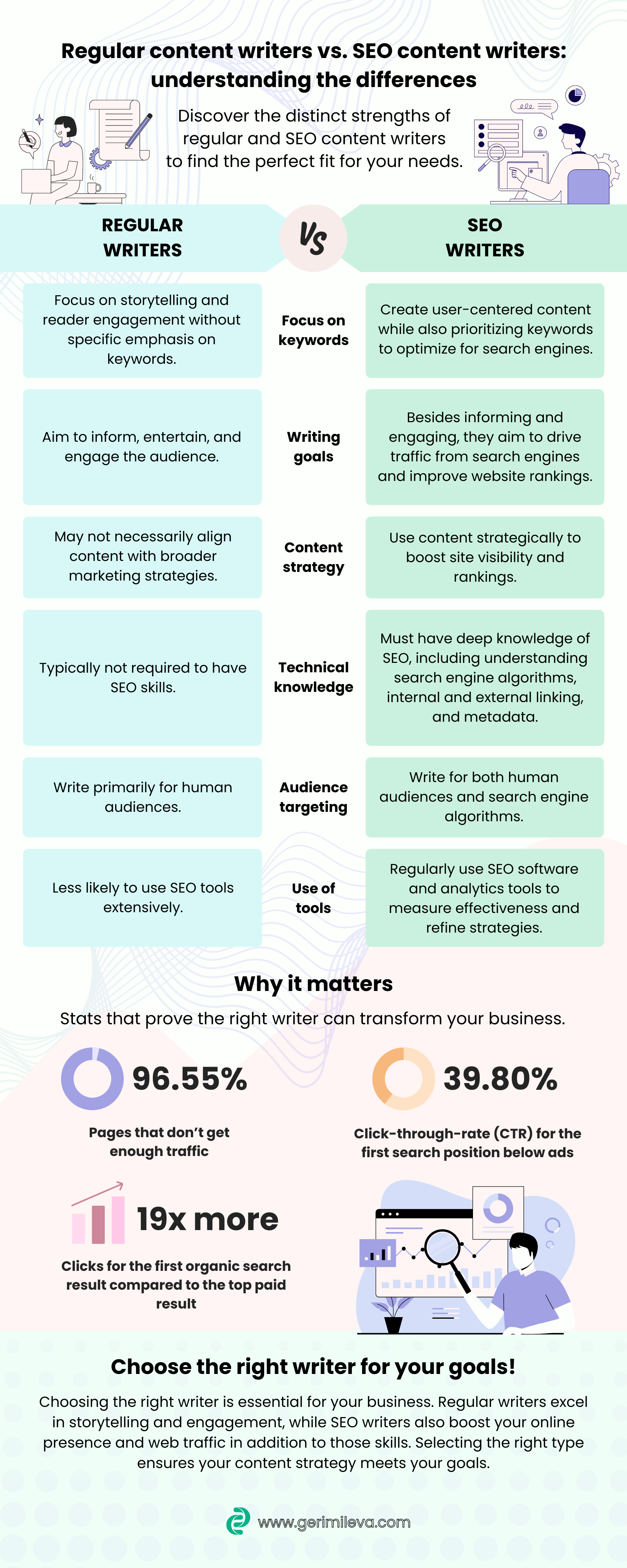
Benefits of quality SEO content
When writers optimize your content for SEO, you reap the following:
Improved search engine rankings
Search Engine Journal’s (SEJ) “State of SEO 2025” report states that 69.8% of SEO professionals struggle with fluctuations in website rankings—also called SERP volatility. An SEO content writer can adeptly execute your content strategy and content plan to weather the changes resulting from updates in search engine algorithms and features.
These writers will use SEO techniques that allow website crawlers to understand your pages more efficiently. This helps search engines determine if your page has the answers internet users need. The relevance of your content to a user’s query determines its position on the search results page.
As people generally trust content that ranks higher on the results page, enhancing your rankings through SEO can subsequently increase your credibility.
Here are some examples of improved search engine positions for challenging keywords. These screenshots from my Semrush account demonstrate how the keywords ranked better after I created content for each respective client.
Example 1: An article about the best crypto exchanges. It ranks for 781 related keywords and many of those are very competitive like “best crypto app”.

Example 2: An article about top marketing agencies I wrote for another client. It ranks for very difficult keywords such as “marketing agencies” and “marketing companies,” among others.

Example 3: An article about Amazon’s daily revenue. It ranks number one for most keywords related to how much Amazon makes in a day. It also ranks for many Google SERP features, like “Instant answer”, “People also ask”, “Featured snippet,” and more.

Example 4: A recent article about letterheads and how to make them—a very competitive niche. It outranked major competitors within the first month of publishing and continues to improve its ranking.

Increased website traffic
Top-ranking content promotes visibility and a positive user experience because hardly anyone bothers to read search results beyond page 1. Only 0.63% of internet users click page 2 of search results pages, according to Backlinko’s Google CTR statistics article.
By securing a higher position in search results, you can boost organic traffic, and these visitors may convert with further engagement on your website.
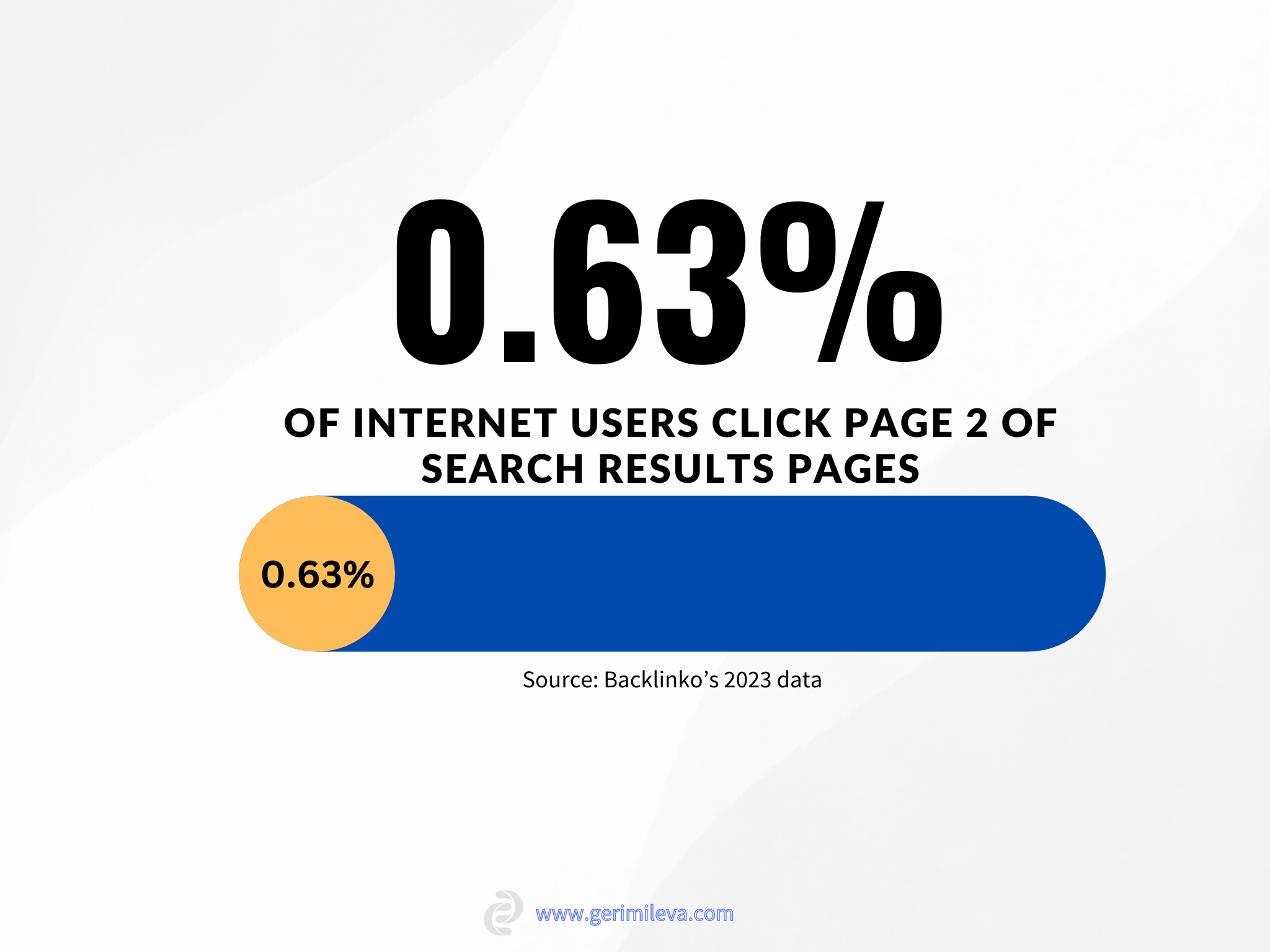
These also lead to cost savings because you appear higher on the search results page without spending on ads.
Here are some examples of increased website traffic for difficult keywords. These screenshots from my Semrush account show how the organic traffic to the respective websites increased substantially after I created content for each client.
Example 1: An article about the best marketing consulting companies that I wrote for a client at the end of 2023. It is an extremely competitive topic, and the article gradually increased its unique visitors from the US to more than 1,300 at the time of publishing this guide.

Example 2: An article about Amazon return pallets that I wrote for another client at the beginning of 2024. This is another very competitive niche. The article’s traffic increased very quickly to more than 2,900 unique US visitors per month, ranking for over 1,300 keywords.
It even ranked and retained its position for top keywords like “amazon return pallets” and “amazon pallets for sale”.

Example 3: An article about editing videos on Instagram that I wrote for Backstage Magazine in April 2023. The article’s traffic gradually increased to more than 720 unique US visitors per month, ranking for over 770 keywords.
Most importantly, it sustained its ranking position and traffic for more than a year, which was full of major Google algorithm updates.
At the time of writing this guide, it is still ranked number one for “how to edit Instagram videos” and a lot of related keywords.

Example 4: An article about how to become a stock photo model that I wrote for Backstage Magazine at the beginning of 2024. The article’s traffic quickly increased to 350 unique US visitors per month, ranking for over 100 keywords.
At the time of writing this guide, it is number one for “stock photo model” and many related keywords.

The examples above attest to the long-term ROI of SEO. Data from the SEJ report shows that budgetary constraints led to client losses among 41% of SEO service providers. However, 92% of marketers said they’ll maintain or increase SEO investments in 2024, according to the “Top Marketing Trends of 2024” report by HubSpot.
Identifying your needs
To truly benefit from hiring an SEO content writer, define your goals so you can decide on the content types to focus on. Some popular formats include blog posts, product descriptions, white papers, and eBooks.
Whatever types you choose to use, your content should offer unique information and insights while meeting search intent at every stage of the buyer’s journey.
Understanding your marketing strategy
Your content marketing strategy is just an idea until it’s written down. You should clarify how the strategy meets your organization’s goals to avoid the risk of losing leadership and budget support. Your team can also go in multiple directions if they only have a vague idea about your plan.
In Semrush’s “State of Content Marketing 2023” global report, 90% of companies polled said they use content marketing as part of their greater marketing strategy, and 66% have it documented.
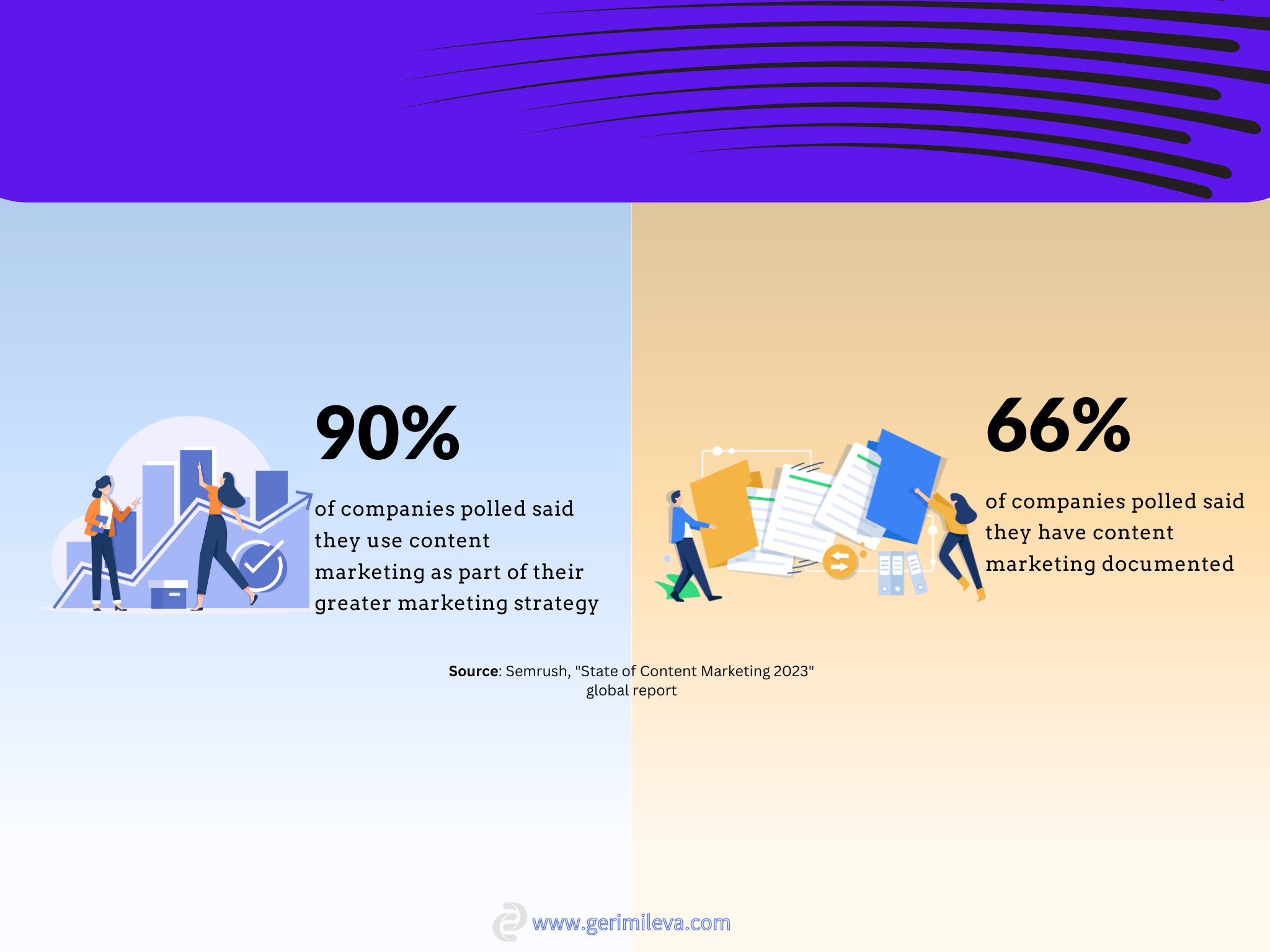
A content marketing strategy involves the six elements below. After writing your strategy, discuss it with your SEO writers so they can understand their job better when carrying out your content plan.
Objective
Know what you or your business executives want to achieve through content marketing. How big is the need? What will it do for your business if you succeed? Why should the company invest in content marketing over other marketing types?
Audience identification
Create audience personas that define your ideal customer’s attributes (demographics), wants, needs, engagement preferences, and how you will help fulfill them.
Content categories
Describing your audience will help you determine themes or categories and sample topics.
Content type and format
Decide on the kinds of content that would be most appealing to your target audience while being within your budget.
Distribution channels and frequency
Specify where you want to publish your content and follow a realistic schedule. You can always increase the frequency of your posts later.
Success metrics
Review and refine your business goals by defining how you want audiences to act on your content. Also, determine how you will measure success and set target timeframes.
Keyword research
Conducting keyword research reveals the terms your target audience uses to find what they’re looking for on search engines. This process also identifies the words and phrases, including variations of keywords, that Google expects about your topic.
Your chosen keywords must be consistent with your strategy and at least one buyer persona. High-volume/traffic keywords are useful for widening brand awareness among your target audience.
Meanwhile, you can use low-volume keywords to target users who are ready to buy. You can use software such as keyword research tools, competitor analysis, and social media monitoring tools to identify your target keywords.
Besides identifying the primary keyword or the term with the highest probability of ranking, SEO writers can also pick out secondary and tertiary keywords. They can also select keywords to match different types of user intent. These terms include:
- Informational keywords – used to find information or answers to a question
Examples: "how to bake a chocolate cake,” “tips for effective time management," "what is climate change"
- Commercial keywords – used to learn more about products, brands, or services
Examples: "best smartphones 2025," "top running shoes reviews," "compare iPhone vs Samsung"
- Navigational keywords – used to find a specific site, page, or brand
Examples: “Facebook login," "NY Times crossword," "Amazon customer service"
- Transactional keywords – used to buy or complete an action
Examples: "buy MacBook Pro online," "Netflix subscription plans," "download Adobe Photoshop"
Once keywords and key phrases are identified, SEO writers include them naturally in the content.

How to hire an SEO content writer
Here are the most reliable places to find such writers and screening tips to determine who’s a good fit for your team and brand.
Know where to find quality content writers
Below, you’ll find my top suggestions for sourcing candidates. You’ll also learn the advantages and disadvantages of selecting from each option. Your requirements and resources will ultimately determine where you’ll get applicants.

Platforms
Over half of marketing leaders (54%) report a growing demand for freelancers in their teams, according to a 2023 Fiverr Pro study.
A forecast from Statista in 2024 shows that 51% of the American workforce, or around 86.5 million people, will consist of freelancers by 2027. This trend underscores the importance of knowing where to hire an SEO content writer to meet your content needs.
Pros:
Cons:
Tip: Hire an SEO content writer from a freelancer platform for relatively small projects where you need moderate to high involvement.
Upwork
Platform overview
Quality and vetting of talent
Cost and pricing
Ease of use
Support and dispute resolution
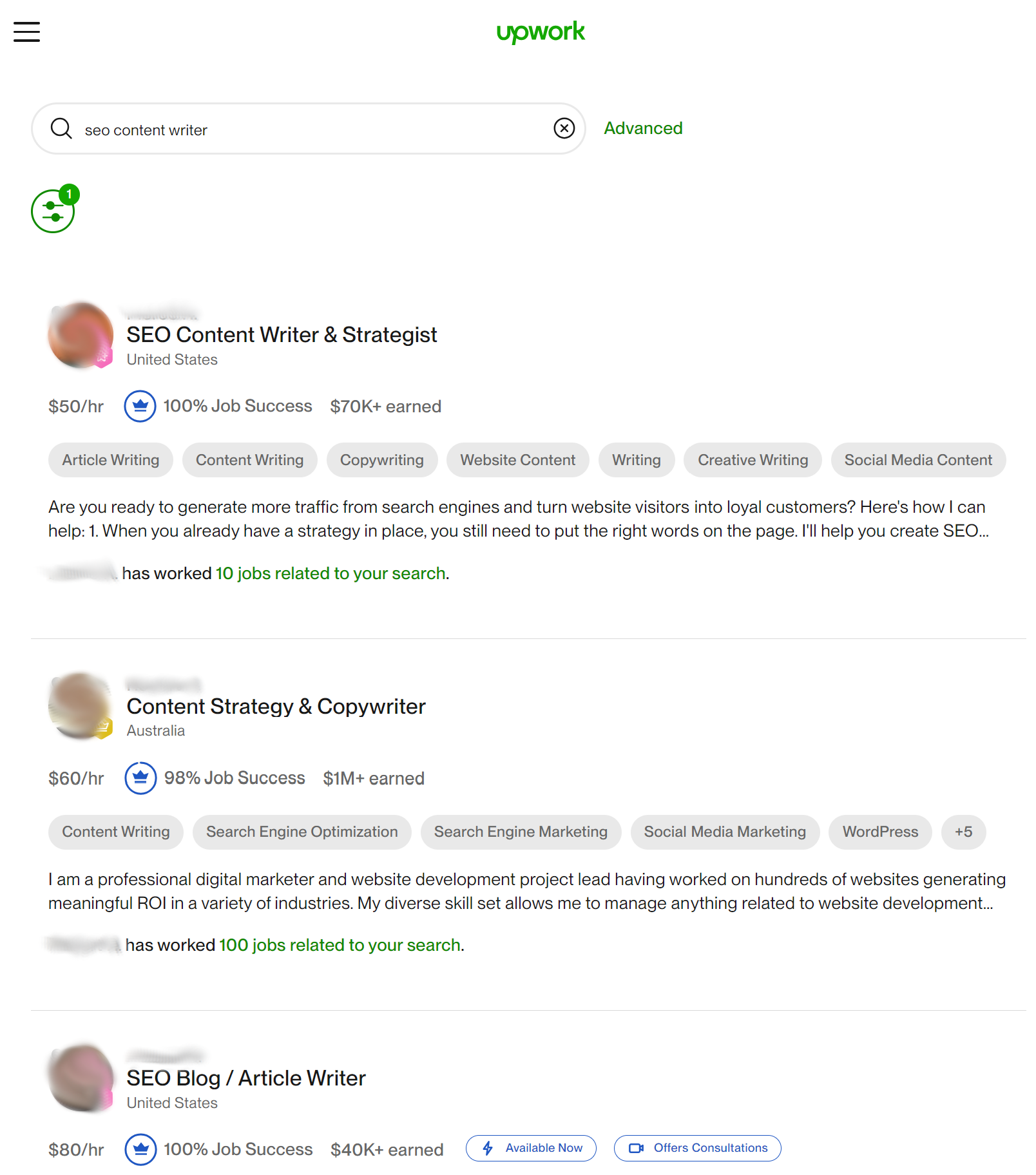
Fiverr
Platform overview
Quality and vetting of talent
Cost and pricing
Ease of use
Support and dispute resolution
Best for

PeoplePerHour (PPH)
Platform overview
Quality and vetting of talent
Cost and pricing
Ease of use
Support and dispute resolution
Best for

Guru
Platform overview
Quality and vetting of talent
Cost and pricing
Ease of use
Support and dispute resolution
Best for
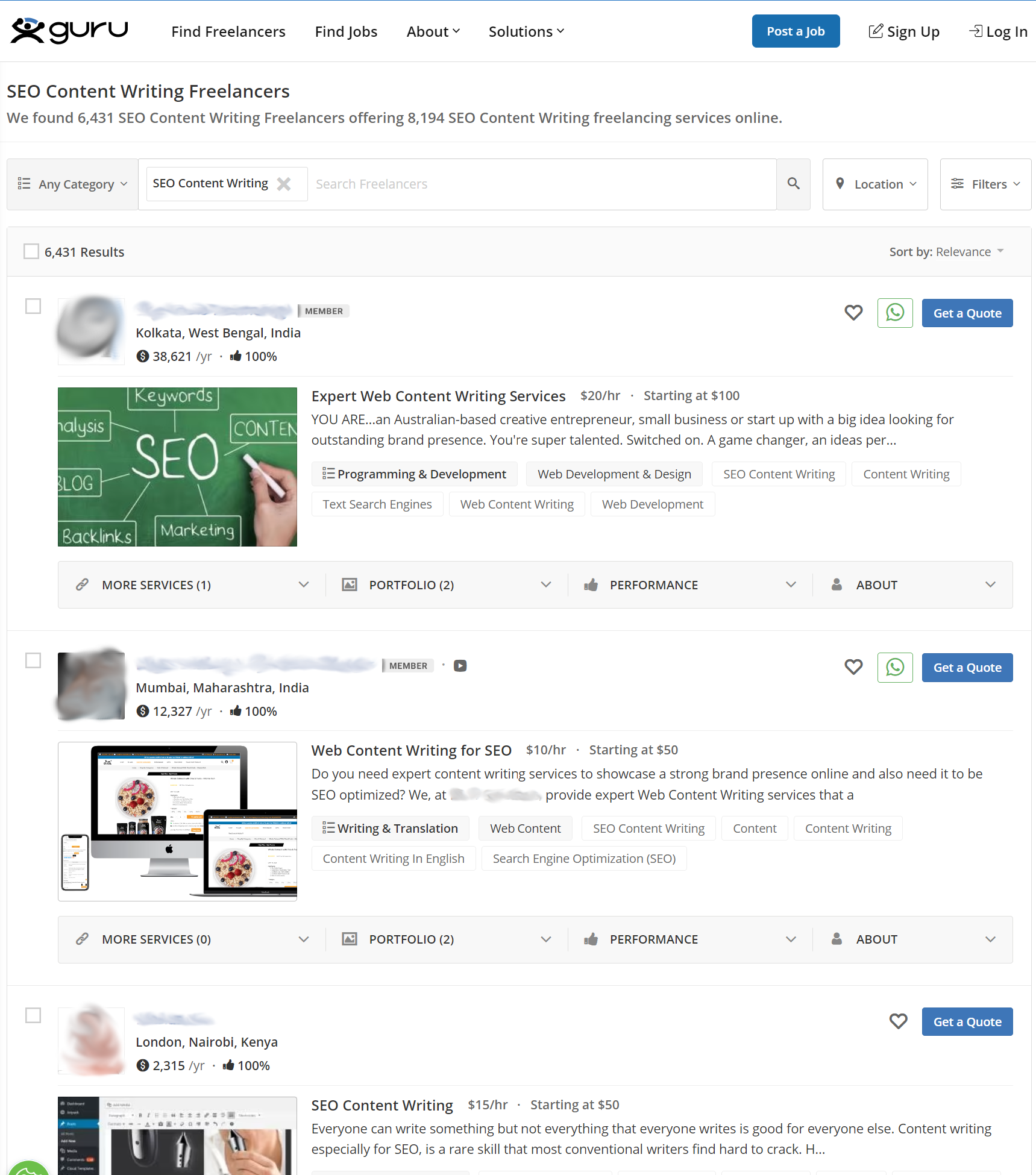
Toptal
Platform overview
Quality and vetting of talent
Cost and pricing
Ease of use
Support and dispute resolution
Best for

Platform comparison: freelancer and employer fees
| Platform | Freelancer fees | Employer fees | Total cost example |
|---|---|---|---|
| Upwork | 10% freelancer service fee | $14.95 one-time contract initiation fee on Client Marketplace and Product Catalog 5% Client Marketplace Fee on all payments | Hiring for a $100 job: Freelancer gets $90, employer pays $100 + $14.95 + $5 = $119.95 |
| Fiverr | 20% fee on earnings | 5.5% of the purchase amount and an additional $2.50 if you buy a project less than $75 | Hiring for a $100 gig: Freelancer gets $80, employer pays $105.50. |
| PeoplePerHour | – 20% (excl. VAT) service fee for below £250/buyer – 7.5% (excl. VAT) service fee for between £250 and £5000/buyer – 3.5% (excl. VAT) service fee for over £5,000/buyer. | £0.6 + 10% via non-bank transfer services, credit/debit card, and 0% (gold members) or 2.5% (silver members) for bank transfers | Hiring for £100 job: Freelancer gets £80, employer pays £110 |
| Toptal | No fee charged to freelancers | $500 deposit (applied to first invoice); mark-up or service fee is confidential, but like agencies, they charge clients higher than what they pay freelancers | Hiring for a $1000 project: $500 deposit, total billed $1,000 |
| Guru | 5-9% depending on membership level | 2.9% handling fee; 100% cashback if you send by eCheck or wire transfer | Hiring for a $100 job: Freelancer gets $91-$95, employer pays $102.90 . |

Exclusive interviews: how platforms work with SEO writers
To give you an even deeper look into how these platforms operate, I reached out to representatives of the ones listed above. I contacted them through every possible channel—official and unofficial. So far, only Fiverr responded, which aligns with my experience with their various teams. None of the other platforms even reacted to my journalistic inquiry.
I had the chance to interview Tal Gonen, Vertical Manager of Digital Marketing, and she shared some fascinating insights about how Fiverr supports SEO writers and connects them with clients.
Job boards
Job boards also offer tools and features to make candidate searches faster and more systematic. They produce an average of 60% of applications across all industries based on CareerPlug’s 2023 report.

Pros:
Cons:
Tip: Search for potential candidates from my recommended sites below. Compared to general job boards, these portals include SEO content writing services among their categories.
LinkedIn Services Marketplace
Platform overview
Quality and vetting of talent
Cost and pricing
Ease of use
Support and dispute resolution
Best for
FlexJobs
Platform overview
Quality and vetting of talent
Cost and pricing
Ease of use
Support and dispute resolution
Best for
Indeed
Platform overview
Quality and vetting of talent
Cost and pricing
Ease of use
Support and dispute resolution
Best for
We Work Remotely (WWR)
Platform overview
Quality and vetting of talent
Cost and pricing
Ease of use
Support and dispute resolution
Best for
Mediabistro
Platform overview
Quality and vetting of talent
Cost and pricing
Ease of use
Support and dispute resolution
Best for
ProBlogger Job Board
Platform overview
Quality and vetting of talent
Cost and pricing
Ease of use
Support and dispute resolution
Best for
Job board comparison: job listing fees
| Platform | Cost to post a job | Subscription/Additional fees | Contact and interaction | Cost example and features |
|---|---|---|---|---|
| LinkedIn Services Marketplace | Free to post services, free to browse; paid membership required to access more search filters | LinkedIn Premium starts at $29.99/month for Premier Career; $170/month or $1,680/year per single license of Recruiter Lite | Contact via InMail: only available for Premium members (5 credits for Premium Career), 30 credits for Recruiter Lite members | Posting and hiring a content writer: $0 platform fee; costs depend on negotiation. Premium Career ($29.95/month) for more InMail credits; Recruiter Lite ($170/month) for more InMail credits and search filters |
| We Work Remotely | Starts at $299 per job listing, which runs for 30 days | No membership required but employer pays additional fees to show corporate logo, highlight ad, and get featured in its Daily Digest | Applicants can only apply, no direct outreach from employers | Posting for a content writer job: starts at $299 |
| Mediabistro | $297 for a single-job standard listing (active for 30 days) | Discounts available for bulk postings | Applicants can only apply, no direct outreach from employers | Posting for a marketing job: starts at $297 |
| ProBlogger Job Board | Starts at $80 per job post for 15 days (without membership) | No additional fees | Website doesn’t mention built-in features for employer-job seeker communication | Posting a blog writing job: starts at $80 |
| FlexJobs | Employer membership required | Memberships range from monthly ($399) to annual ($2,999) subscriptions | Unlimited contacts within subscription, employers can initiate contact and receive applications | Basic membership for unlimited job posts: $399/month |
| Indeed | Free job postings available | Sponsored postings: prices vary based on your budget | Employers can initiate contact and receive applications via dashboard | Sponsored post budget: at least $5/day, estimated total of $150/month |
Agencies
Consistent content production is among the top three challenges of enterprise marketers, according to Content Marketing Institute’s content marketing survey conducted in July 2023. If you’re a mid to large-sized company that needs two or more writers to produce blog posts and other SEO content regularly, you might want to consider hiring an agency.
With their established creation and collaboration processes, agencies can consistently meet SEO requirements based on various personas and buyer journey stages. Their broad expertise mix enables your brand to explore various content types. Agencies also have the technological capacity to grow with you as you widen your reach.
Pros:
Cons:
Tip: Always check what’s included in your SEO content writing package. These deliverables should be part of your contract with the agency.
Contently
Contently offers content strategy and editorial services through its network of expert writers and journalists. The agency provides a quote for an annual subscription based on your content creation budget.
It also searches for writers who match your content strategy. These writers have received training using Contently’s content-planning and brand management tools.
Skyword
Skyword is another SaaS company with a vetted talent pool— including real-life practitioners—with niche specializations.
Its proprietary, subscription-based Skyword 360 platform facilitates writer onboarding and content production workflow. You can track performance and automate payments from the same portal.
Clearvoice
Clearvoice can find an SEO content writer or a writing team for your one-off or regular content production requirements. An assigned customer success manager finds a match from its over 4,000-member network. You can then collaborate with the chosen freelancer using the Clearvoice dashboard.
Acquired by Fiverr in 2023, the agency can also provide SEO strategists and workflow/editorial guidance.
Content agencies comparative table
| Agency | Basic fee structure | Additional fees | Typical project costs | Key features |
|---|---|---|---|---|
| Contently | Custom pricing based on project scope | Possible setup fees for platform access | Projects can start from $2,000 according to Capterra and GetApp | Expert-level talents trained on Contently platform usage, feature-rich CMP, dedicated managing editors |
| Skyword | Custom pricing | Setup fees may apply for platform use and strategy development | Platform use alone starts at $5,000 according to Capterra and GetApp; strategy and content volume needs will add to total cost | Integrated content creation and distribution, SEO optimization, content audit and business intelligence |
| ClearVoice | Pricing per piece or via managed services | No standard additional fees; custom services (add-ons such as illustrations, photography, or social media/email snippets) may incur costs | Platform use starts at $99/month according to Capterra and GetApp; cost of managed services depends on work scope. | Freelancer matching technology, simple interface, flexible content scaling |
Social media
Seven in ten companies that responded to The Harris Poll survey said they used social media to research potential candidates. The survey—conducted in December 2022 and released in May 2023— involved 1,002 hiring staff.
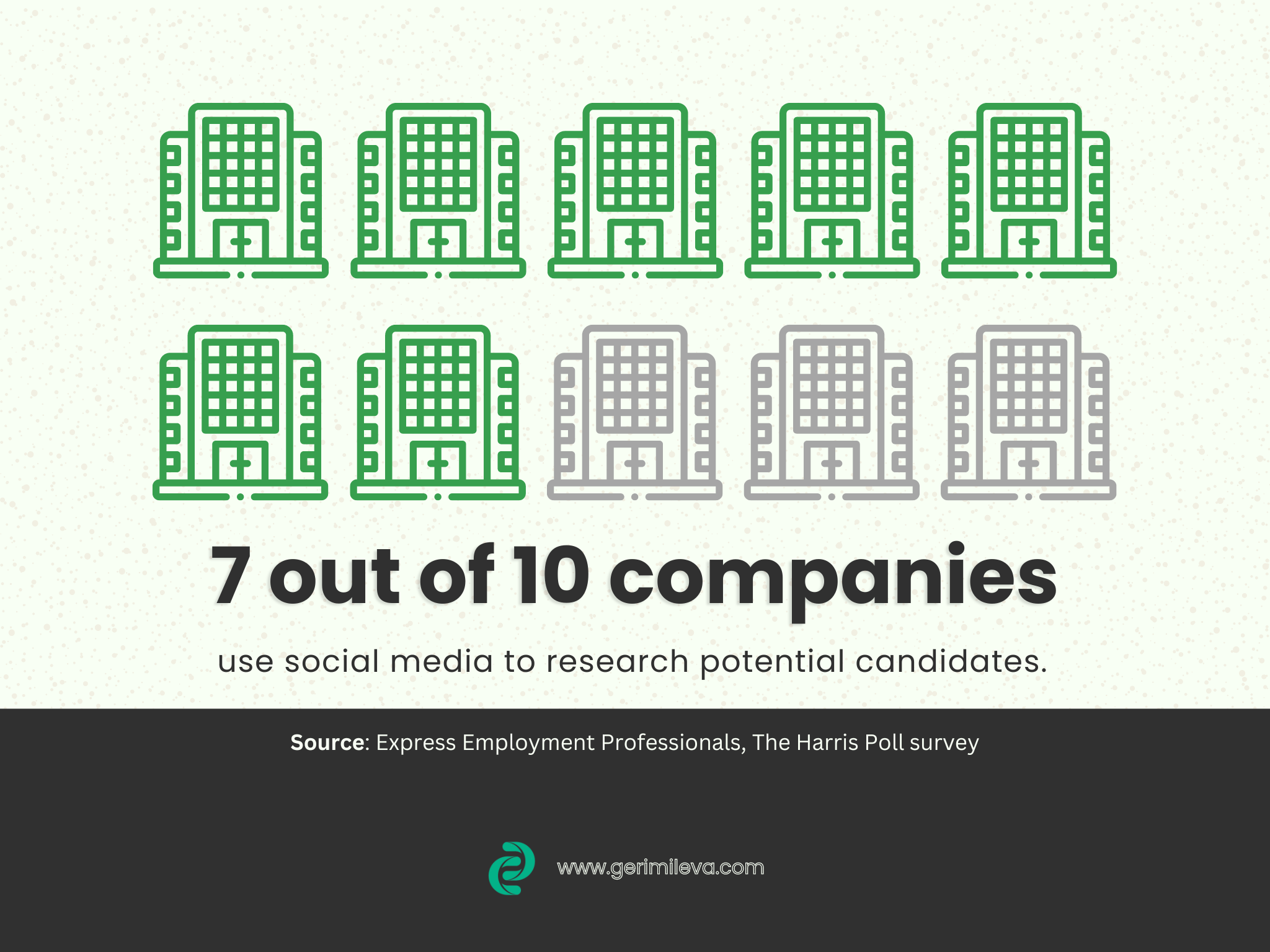
When using social channels to scout for SEO writers, visit Facebook, Slack, or LinkedIn writing groups to narrow your search. These accounts could contain work or education-related information about a writer that isn’t on their resume.
You may also find potential candidates by typing hashtags on your social channel’s search bar that pertain to SEO writing. Try using hashtags such as #SEOWriter, #SEOfreelancers, #ContentWriter, #FreelanceWriter, #hiringcontentwriter, or #freelancewritingwork.
Pros:
Cons:
Writing groups for job postings and networking
| Platform | Group/Channel name | Focus/Area | Conditions for posting jobs |
|---|---|---|---|
| Tech Ladies® | Tech jobs (engineering, product management, design, and marketing), U.S. focus (80% of community members are from America) | Must enter into hiring partnership via website, www.hiretechladies.com ($3,999 for three months) | |
| Digital Nomad Girls (DNG) Community | “Location- independent” online entrepreneurs; women only | Sign up for membership so the group can post your job openings in the DNG Newsletter | |
| Skip’s Remote Job Board — US EdTech and Education-Adjacent Jobs (part time and full time) | Remote jobs in education; US-based | Join and post jobs that meet these salary criteria: remote, $35+/hr (part time) or $70k+/yr (full time); job postings appear on: https://edskip.com/ | |
| The Freelance Writer’s Connection | Freelance writing | Must be a group member; job postings need admin approval | |
| Authors & Publishers Association | Publishing industry | Join the group and follow admin guidelines when posting; messages must carry value beyond just jobs |
Writing communities and forums
You can also find SEO content writers on forums and online communities, where some purposely join to find job opportunities. Members may recommend or even post writing projects here.
Reddit (subreddits like r/HireaWriter or r/freelanceWriters), Absolute Write, or Writer’s Digest are some good places to conduct your search.
Pros:
Cons:
Professional associations
Some writers have formed associations where they can promote their services collectively. Check out the following to discover and connect with professional writers:
Pros:
Cons:
Posting jobs and finding writers through professional associations
| Association/Directory | Can you post jobs? | How to find writers | Conditions/Costs |
|---|---|---|---|
| Copyblogger Certified Content Marketers | No | Search the directory for certified SEO writers (includes website, email, and social media info). | Free access |
| Certified Writer’s Directory | No | Use the directory to find individual writers (links to sample work, website/email address available). | Free access |
| All Freelance Writing Directory | No | Browse profiles manually—no search bar or filters (all members charge at least $50 per article/per page/per hour). | Free access |
| American Writers and Artists Institute (AWAI) | Yes | Click “Directory of Writers” in the footer menu to view its freelancer directory (Professional Writers’ Alliance) for free. Click individual names/images to view the writer’s specialization (no search bar). Registration as a marketer required for job posting. | Free access to the directory; to post a job, register for free as a marketer at https://www.awai.com/writers-wanted-signup/. No other information on fees and other terms. Your job listing will appear on AWAI’s job board https://www.writerswanted.com/. |
| American Society of Journalists and Authors (ASJA) | No | Go to https://www.asja.org/finder/ to search for an SEO content writer. | Free access to directory; no job board. |
Direct outreach
Seeking recommendations or referrals from trusted sources, such as colleagues, friends, and relatives is another way to find a suitable SEO writer for your business. I believe these trusted sources would only recommend people with whom they’ve had a positive experience.
You could also come across a blogger or content creator whose work resonates with your brand. You can connect with the writer, explaining how their writing impressed you. Then, you can explain why you’re reaching out and give them details on why you want them to write for you.
Pros:
Cons:
Evaluating SEO content writer skills
Once you’ve received applications, consider the following aspects when reviewing your shortlisted candidates:
Portfolio
Reading applicants’ samples allows you to evaluate their writing ability (structure, grammar, and clarity) and skill range (content types handled). Professional SEO content writers typically use their websites to showcase their past work. Look for niche-specific samples that prove the application of SEO principles (topic-related keywords, links, impressive intro or hook, and good formatting). Their works’ publication on authoritative websites is a plus.
Understanding of SEO techniques
Pick someone who knows on-page optimization—including the use of compelling title tags, meta tags, and header tags)—aligns writing with search intent and optimizes internal links. Good SEO writers also ensure content readability by using headers, subheadings, and relevant visuals.
Keyword research abilities
The best SEO content writers go beyond using keywords and phrases. Clients usually provide the keywords for SEO content to align with their marketing goals. However, SEO writers may suggest or refine keywords by considering metrics like keyword volume, search relevance, competition level, and keyword difficulty to enhance search engine rankings.
Common mistakes when hiring an SEO writer
You can fall into pitfalls when outsourcing your SEO content writing. Errors can lead to strategic misalignment, sub-optimal results, and ultimately wasted resources. Being aware of the common mistakes below can mitigate potential drawbacks:
- Hiring based solely on cost
- Mistake: Going for writers offering their service at the lowest price without scrutinizing their experience and work quality
- Why avoid: Meager costs may indicate a lack of SEO expertise and a narrow range of services. You can get more effective, long-term results by investing in a quality writer.
- Skipping the portfolio review
- Mistake: Not thoroughly examining their past work to determine if their expertise, style, depth of coverage, and readability match your brand voice, niche, target audience, and marketing goals
- Why avoid: Reviewing applicant portfolios allows you to assess the quality and effectiveness of their past projects. The practice also helps you gauge whether their strengths and adaptability level will see them through your campaign.
- Failing to test practical skills
- Mistake: Selecting candidates based on referral, resume, and portfolio and not through a sample task or writing exam
- Why avoid: A written exam will help back up claims on their credentials list, particularly meeting SEO requirements, understanding content goals, and adhering to other guidelines.
- Overlooking industry-specific experience
- Mistake: Failing to ask the number of clients they’ve worked for in your niche and sample work submitted to these companies; not verifying whether they’ve written for any company that can be considered as a business competitor
- Why avoid: SEO writers who specialize in your sector are familiar with the nuances of communicating with your target audience. They also have strategies to navigate the competition and industry trends.
- Ignoring soft skills and cultural fit
- Mistake: Not evaluating soft skills, such as communication, problem-solving, collaboration, and creativity
- Why avoid: Your chosen writer should show a balance of technical and interpersonal skills. Flexibility in grasping your vision and incorporating feedback will allow them to move forward more quickly and gel easily with your team.
- Neglecting to set clear expectations upfront
- Mistake: Not clarifying your editorial process, particularly timelines and deliverables
- Why avoid: Reinforcing your standards ensures you and your SEO writer are on the same page about deadlines and revisions. Clarifying your expected workflow also prevents misunderstandings, which can delay progress. This step can weed out your shortlist of freelance writers who juggle too many projects simultaneously.
- Not assessing SEO tools proficiency
- Mistake: Failing to conduct a trial task to verify the skills, certifications, and output on a candidate’s resume and online portfolio
- Why avoid: Software proficiency is critical for keyword research, rank tracking, and analytics interpretation. Writers may not meet your SEO targets without the necessary experience in using essential tools.
- Relying on AI-generated content
- Mistake: Hiring writers who rely on generative AI as a shortcut instead of putting in genuine effort and creativity, especially without being transparent or ensuring thorough oversight
- Why avoid: AI-generated text lacks the depth, originality, and emotional intelligence of human writing. It struggles with brand nuances, audience sensitivities, and creative storytelling, leading to bland or inaccurate content. Human writing brings the strategic thinking and personal touch needed to craft authentic, engaging narratives that truly connect with your audience.
- Overlooking the importance of search intent
- Mistake: Not checking the applicant’s understanding of search intent and whether they consider this factor when writing
- Why avoid: Pro SEO writers focus more on satisfying search intent than meeting your word count. Without capturing search intent, content tends to be uninspiring, potentially increasing bounce rates and lowering conversion rates.
- Not discussing long-term content optimization
- Mistake: Skipping scrutiny of the candidate’s process of ensuring content effectiveness through regular updating and optimization
- Why avoid: Content optimization is a never-ending process. Writers must continuously revisit and refine their initial output to adjust to algorithm changes, consumer search behavior, and industry developments. Staying relevant will prevent a decline in user traffic.
- Assuming all SEO writers understand analytics
- Mistake: Expecting every SEO writer to understand analytics and know how to interpret them to improve content on your website or platform
- Why avoid: Understanding performance metrics is vital in determining what’s enticing or dampening interest in your online content. The average time spent on your site or a particular web page, acquisition reports showing how users find or end up on your site, organic traffic, bounce rate, and conversion rate indicate user behavior. Insights from these metrics allow you to improve your strategy, from reassessing keywords to providing shorter reads or creating more engaging social media messages.
- Hiring without discussing content structure and readability
- Mistake: Failing to evaluate whether the candidate can find a sweet spot between SEO and a smooth and enjoyable reading experience
- Why avoid: An over-focus on keywords can reduce user engagement. A balanced approach naturally incorporates keywords or key phrases while maintaining clarity and flow.
- Ignoring the need for adaptability across content types
- Mistake: Not checking the writer’s capability to handle various formats beyond their specialization (blog articles, product pages, landing pages, email newsletters, or social media posts)
- Why avoid: SEO writers should be able to customize their writing to the unique requirements of each content type. This versatility brings more value to your content strategy.
- Failing to evaluate past successes with SEO content
- Mistake: Related to error #2, this issue involves neglecting to examine more closely which SEO areas applicants excelled in for past projects and the success levels reached
- Why avoid: Performance metrics such as improved traffic, search rankings, and conversions prove their writing’s impact. These metrics also allow you to compare the most promising candidates.
- Not considering long-tail keyword experience
- Mistake: Overlooking a writer’s experience with integrating long-tail keywords into their content
- Why avoid: Using long-tail keywords drives high-intent search organic traffic to your website or social channel because they’re more specific. These readers are more likely to convert.
- Disregarding local SEO skills, if relevant
- Mistake: Not verifying their SEO experience for localized content when geo-targeting is a priority
- Why avoid: Local SEO requires a tailored approach. Selecting an SEO writer with this expertise—particularly in your targeted locations—can help you achieve your campaign targets.
- Not setting up a revision and feedback process
- Mistake: Lacking a system for revising work and exchanging feedback
- Why avoid: Clear policies can reduce or eliminate possible friction from revision requests, hastening delivery and improving the quality of deliverables.
- Skipping a discussion on deadlines and workflow
- Mistake: Foregoing talks on following SOP and meeting deadlines
- Why avoid: Your campaign or company operations can get behind schedule if your writer can’t work within your timeline. Establish your expectations so everyone can stick with your game plan.
- Neglecting to verify familiarity with brand voice
- Mistake: Failing to assess whether a candidate can adjust content to suit your brand voice and style
- Why avoid: Keeping your brand tone consistent across content formats and platforms makes you more memorable and relatable. A cohesive identity strengthens connections with customers and lifts your authority in the industry.
- Rushing the hiring decision
- Mistake: Wanting to fill the position early without conducting due diligence on your applicant’s credentials, past work, specialization, and cultural fit
- Why avoid: If you don’t take the time to vet your SEO writer, you might end up with someone who doesn’t live up to their resume or interview answers. Research carefully and test them besides reviewing their portfolio to ensure you get a quality hire who can meet your goals.
Plan your interview questions
Use this list of suggested questions to examine the extent of your applicants’ knowledge and capabilities for handling SEO writing projects.
Understanding of SEO
- How do you stay updated with Google’s algorithm changes and SEO best practices?
- Google regularly updates its algorithm to make search results more relevant to its users. SEO writers who stay on top of these changes can take prompt action to prevent their search ranking from sliding drastically.
- Can you explain the importance of keywords in SEO content writing?
- Your candidate’s response will help you assess their knowledge level of basic SEO principles.
- How do you conduct keyword research and select the right keywords for a project?
- Because keyword research is critical to your content’s performance, ask the applicant’s process for identifying effective keywords.
- What’s your approach to balancing SEO and engaging content?
- Writers can best prove this through their sample work. However, their reply can provide insights into how they prioritize online visibility without sacrificing reader engagement.
- How do you optimize content for both search engines and users?
- This question is a follow-up to the previous one. An applicant’s answer can reveal their techniques for achieving this balance for quality SEO content.
- What strategies do you use to reduce bounce rate and increase dwell time on a page?
- An experienced SEO writer knows that it takes a good mix of the following to boost a web page’s dwell time, inversely lowering the bounce rate:
- engaging and high-quality content
- website optimization for fast loading and mobile use (this should be done by the client)
- multimedia assets
- strategic use of internal linking and compelling calls to action
- Additionally, regularly updating content, improving readability, providing clear navigation, and including related posts can further enhance dwell time.
- An experienced SEO writer knows that it takes a good mix of the following to boost a web page’s dwell time, inversely lowering the bounce rate:
Experience and expertise
- Can you share examples of successful SEO content you’ve written?
- Request applicants to present their portfolio to examine how their writing style impacts you.
- What industries or niches have you written for previously?
- A writer’s website or the platform where you found them typically includes this information. However, you can ask for specifics not mentioned online.
- Find out if they’re servicing other companies in your niche (including your competitors). Ultimately, their answers will clarify their expertise and versatility.
Performance measurement and analysis
- How would you measure the success of your SEO content?
- Effective SEO doesn’t stop at writing. It involves analyzing your content’s performance against several metrics, which your candidate must be familiar with.
- Can you provide an example of a time when you significantly improved traffic or rankings for a particular keyword or page?
- If a case study isn’t part of your pre-interview requirements, ask applicants to be ready to present one during the interview. Such reports or studies are necessary to back up any claims found on their resumes or online profiles.
Content strategy and execution
- How do you handle SEO for different types of content (e.g., blog posts, product pages, landing pages)?
- Choose a writer who can create content for the formats you publish. This question will help you determine if they do, including what they specialize in.
- How do you integrate long-tail keywords into your content without sacrificing quality?
- Using long-tail keywords to capture targeted traffic is a skill that SEO writers acquire over time. Seasoned content creators seamlessly integrate them into their content while maintaining its natural flow.
- Describe your process for updating and optimizing old content.
- Let your applicant share their steps or workflow for adding SEO value to existing content.
- What’s your experience with local SEO content strategies?
- Local SEO is a strategy that aims to generate online and offline visits by internet searchers within your company’s physical vicinity. Content writers who practice local SEO can improve traffic to your website and store or office.
- Do you use AI in developing content? How?
- Several writer’s tools contain an AI element. They include keyword research software, grammar checkers, analytics platforms, and other tools that can help speed up the writing process. However, you should clarify with them if you do not want them to use AI in writing content. To verify if content has been AI-generated, you can use an AI detection solution to scan the body text.
Working relationship
- What is your workflow for revisions and feedback?
- The applicant may share their setup or practice with current clients. You can ask for details in line with your expectations or preferences.
- How do you stay organized and meet deadlines?
- Ask them how their typical work day goes and what process they follow to ensure timely delivery.
- Can you work with specific SEO tools or platforms we use?
- Identify your tools (like SEMrush, Ahrefs, or Google Analytics) and verify if they’re familiar with them. Ask them to rate their skill level on a scale of 1 to 5 (with 1 being the most proficient).
- What do you need from us to be most effective in your role?
- The candidate’s answer allows you to discover their expectations. This also allows you to assess their preparedness for the task and compatibility with your work ethic.
Industry rates of SEO content writers
Various factors affect the asking price of SEO content writers. They include the following:
Writer’s experience
Veteran writers or those who belong to established agencies tend to command higher rates. Agencies typically mark up prices, so their rates are higher than freelancers.
Location
Writers in areas with high living costs tend to have higher fees than those based in locations with lower living standards.
Pricing model
Freelance and agency writers may charge hourly, monthly, by the number of words, or by article/project. In a 2023 survey of 346 freelance writers from 31 countries by All Things Freelance Writing, $0.16 to $0.30 emerged as the most popular (24.6% of respondents) pay-per-word pricing range worldwide. The most common range in the U.S. is $0.31 to $0.50.
For hourly rates, the highest percentage of participants (26.9%) worldwide charged $51 to $75. Meanwhile, most US-based respondents (32.3%) charged over $101.
Meanwhile, agency owners interviewed in the SEO podcast “Optimize” gave various pricing. For instance, Superpath co-founder and CEO Jimmy Daly said a 1,200-word piece is worth $1,200. Meanwhile, developer content agency Draft.dev founder Karl Hughes says a 2,000-word technical article can range from $500 to $2,500.
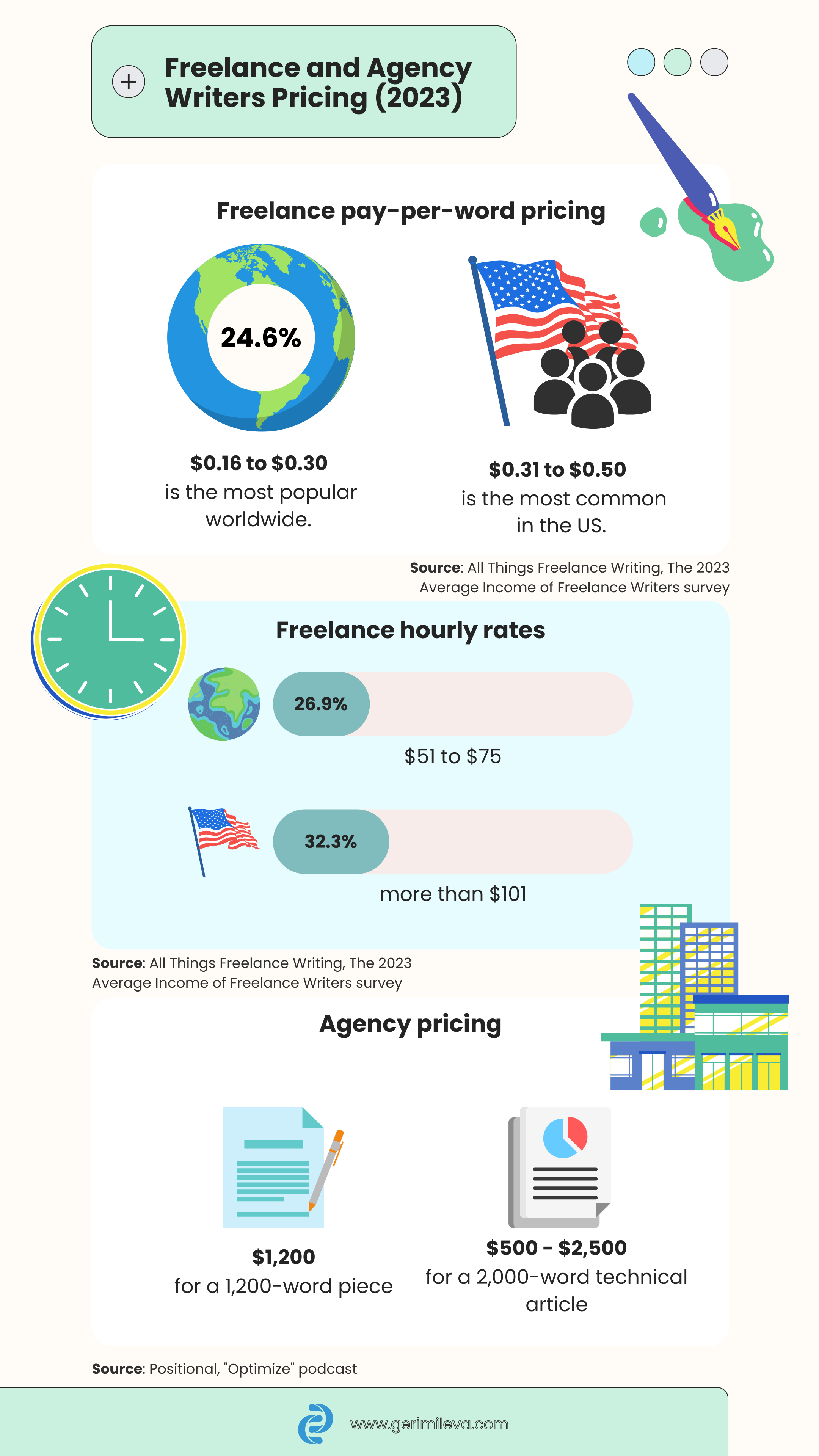
Work scope/services you need
Verify if the service deliverables in the freelancer or agency writer’s proposal cover everything you need. SEO writers typically focus on on-page optimization, which covers:
Keyword optimization
This function refers to integrating relevant keywords into the content (although an SEO strategist would typically handle the keyword research and selection with the aid of software). Your chosen key terms must naturally appear throughout the content, particularly the title, subheadings, introduction, and conclusion.
High-quality content
The written piece must be well-researched and informative to provide value to your target audience. At the same time, it should be original and engaging enough to sustain your readers’ attention from start to finish.
Meta descriptions and title tags
SEO writers are responsible for supplying effective and SEO-friendly titles and compelling meta descriptions featuring your targeted keywords. They provide the text for the meta tags needed by your publishing staff to upload the content into your content management system (WordPress, Shopify, and others).
Header tags
SEO content writers should organize content into sections, each with an appropriate header (H1, H2, H3) that results in a logical flow for optimum readability.
Image alt text
You can tell your SEO writer to include “alt text” or alternative text for visuals if they are responsible for providing images or videos for their written work. Alt texts appear in place of visual elements while they load, giving site visitors an idea of what will appear on the screen.
Internal linking
SEO writers can also link other content within your website into their current work to build your brand authority and encourage your readers to explore your site (longer!).
Tools used in SEO writing
Writers pay subscription fees to use various tools, including those for keyword research, grammar checking, plagiarism scanning, and AI detection.
There are many tools available on the market, but the following list includes those I am most familiar with and can personally vouch for. Here’s a breakdown of the key services that experienced SEO writers use, highlighting the ones I personally utilize:
Keyword research and SEO analysis
Content optimization
Technical SEO
Grammar and style checking
Plagiarism checking
AI content detection
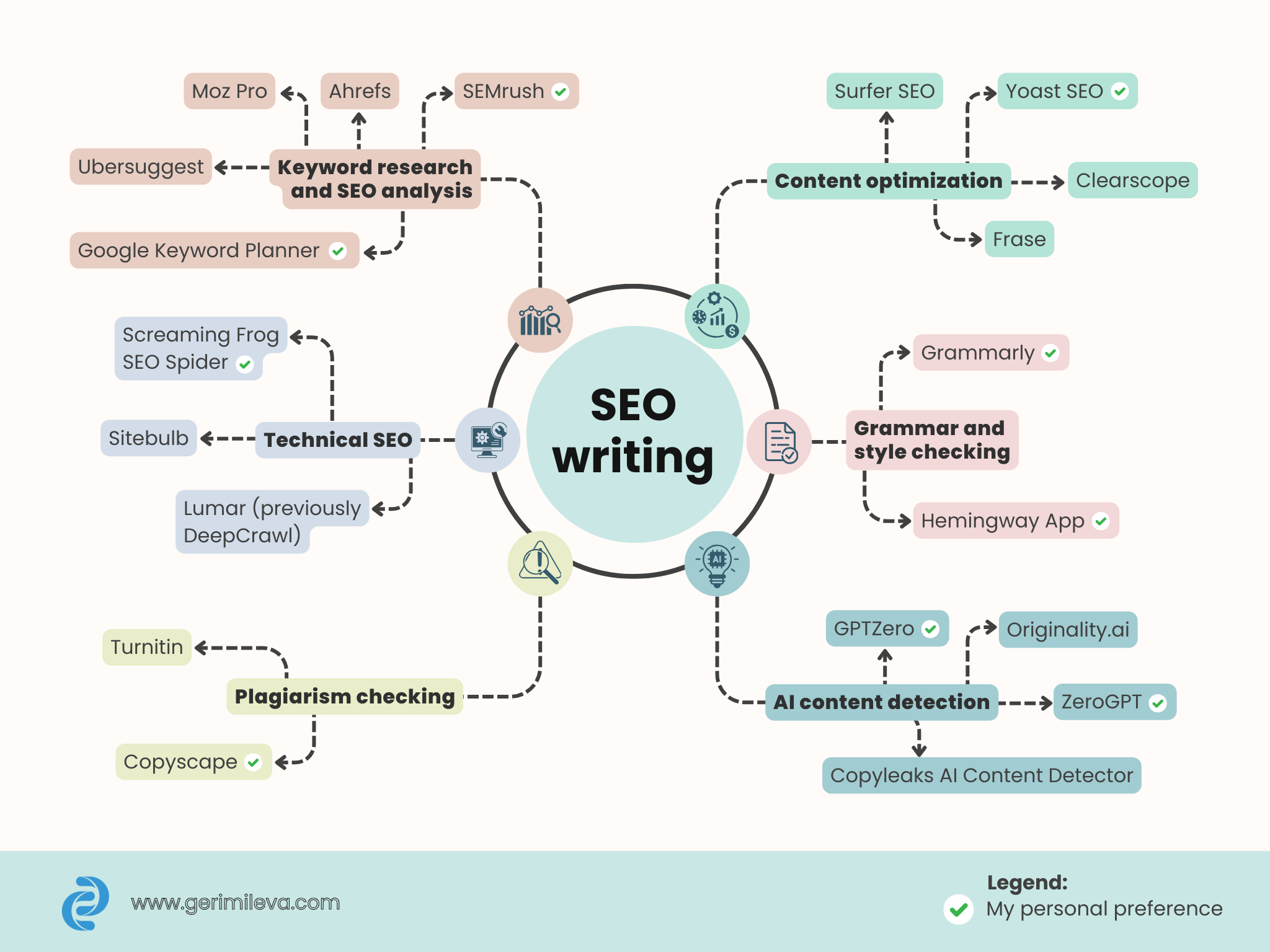
Your content manager plays a vital role
If you have a marketing team, I highly recommend that you have an assigned content manager before you hire a freelancer or agency. When necessary, this person can be your proxy in working with a content writing agency’s account manager.
Content managers oversee the day-to-day activities involved in producing content. They typically coordinate with the team’s strategists and creators. They assign tasks to creators, outlining the goals for each content piece.
They also ensure that the content complies with quality standards and that it gets distributed on time. In some cases, they also develop content strategies, create an editorial calendar, and keep track of content performance.
Working with your SEO content writer
After selecting your writer, the next step is to onboard them. Proper onboarding sets the tone for a productive and long-term partnership. As you embark on this collaborative journey, consider these three areas:
Best practices for collaborating with an SEO writer
When onboarding your writer, you should provide a company introduction, share internal documents (style guides and checklists), and give access to your tools.
Using tools and platforms
Writers need all the necessary resources to collaborate with your team and submit their tasks.
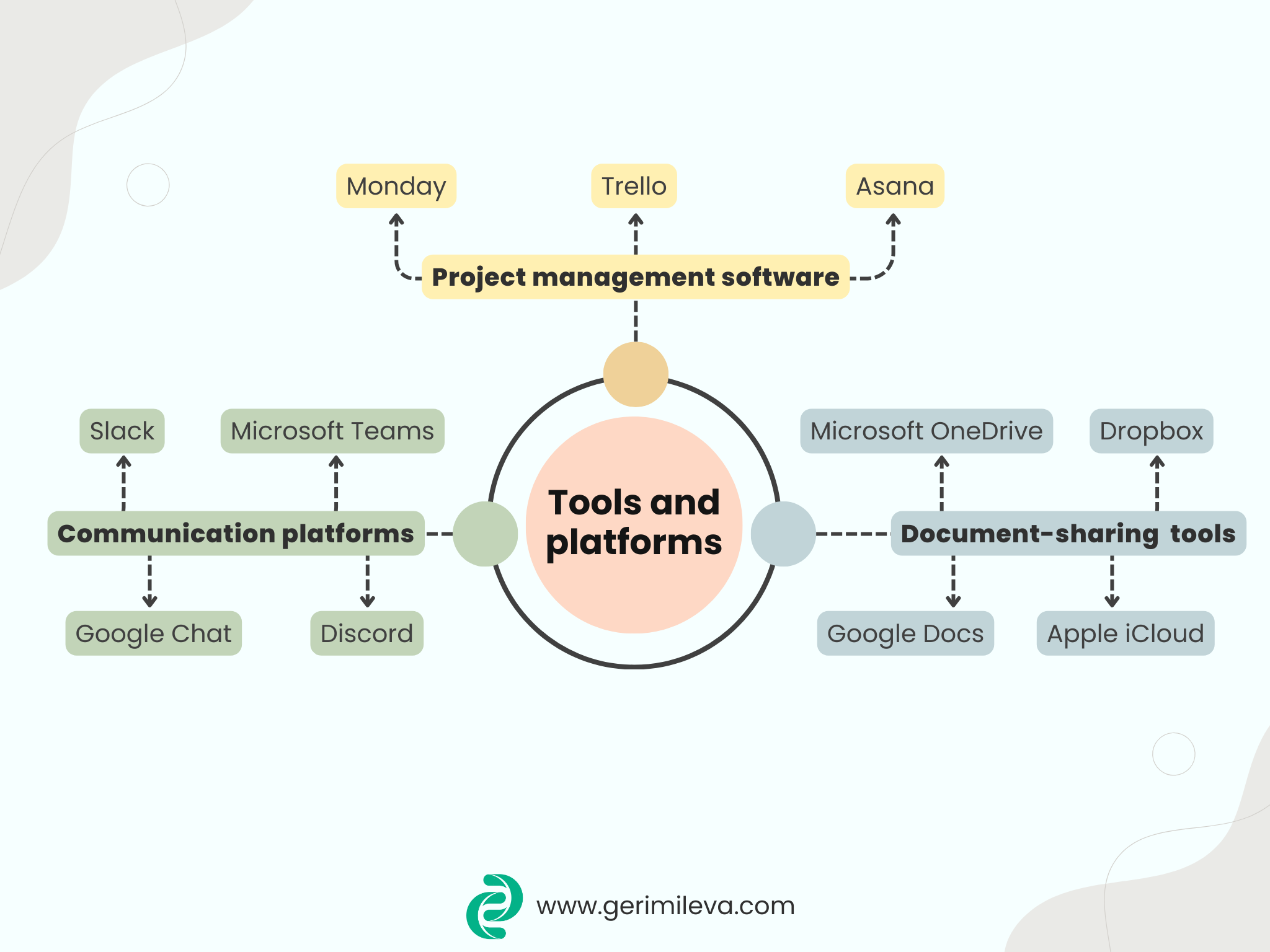
Project management software
Project management tools streamline workflows by serving as a central hub for scheduling writing tasks, storing files, and connecting people across teams. Let me share three tools that have proven efficient in my years of working with remote teams and various clients.
Trello
Asana
Monday
Communication platforms
Make your writer feel supported and engaged by sharing your preferred communication channels. Access to a messaging system lets you quickly notify your writer about any urgent updates or changes related to their task. At the same time, your writer can easily reach you for any clarification or feedback.
Reserve meetings for onboarding new writers and discussing complex projects. You don’t need to meet regularly about their duties and how to accomplish them when you have knowledge bases and project management software.
Document-sharing tools
You and your writer can upload and view content briefs, drafts, and accomplished content on a cloud-based solution, like any of the platforms I share below. Once a file is saved on the platform, you only need to click the “Share” button to create a link. You can then send that link via email or chat so the other party can view the document. The history view lets you see a document’s previous versions, who edited the document, and when the edits were done.
| Platform | Free storage | Capacity of basic paid plan |
|---|---|---|
| Google Docs | 15GB storage | 100GB |
| Microsoft OneDrive | 5GB | 1TB under OneDrive for business (Plan 1) |
| Apple iCloud | 5GB | 50GB |
| Dropbox | 2GB | 9TB (for teams, 3 members) |
Setting clear expectations and goals
Clarify your goals and expectations to ensure your SEO content writer’s work is consistent with your brand’s voice. This alignment is important because a majority (over 30%) of successful businesses prioritize consistency in customer experience across channels, according to PwC’s Market Winners Survey held in 2023.
Among the vital steps in establishing expectations are setting realistic due dates and publication frequency. Share your content quality guidelines and outline your work scope so that writers can understand your requirements and manage their schedules effectively. You should also have enough time for revisions and adjustments.
Monitoring progress and adjusting strategies as needed
After your SEO writer’s work is edited and published, it’s time to ensure the content is producing the results you expect. To do this, define your key performance indicators (KPIs) for measuring the impact of your writer’s content. These metrics will help you determine which aspects of the content are resonating with your audience, and which areas require further enhancement for a more effective and engaging message. I’ll discuss choosing KPIs based on your goals in the next section.
Enterprise marketers have mixed sentiments on how to measure content writing outcomes. Only 39% of those polled by the Content Marketing Institute (CMI) in July 2023 say they do so effectively.
Results of CMI’s survey showed that website traffic (76%) is the most widely used metric. This was closely followed by site engagement (75%), email engagement (72%), and conversions or sales and leads (68%).
Social media engagement was also a key performance criterion for 68% of respondents. Interestingly, less than half (46%) considered search rankings as vital success factors, indicating a diverse range of priorities among enterprise marketers.

Cultural fit and soft skills considerations
Personal traits and abilities can be hard to measure from the outset, whether you’re hiring an office-based or remote SEO writer. Although challenging, vetting candidates for these qualities is possible through extensive conversations and practical “tests” during recruitment. Below, I discuss some tips to help you screen for cultural fit and soft skills.
Importance of cultural fit
Why it matters: Evaluating an applicant’s cultural fit means determining whether they can work effectively within your internal team’s dynamics. Someone who aligns with your company’s culture and values is a good fit, boosting productivity and engagement while lowering turnover.
Key indicators of cultural fit: Adaptability, openness to feedback, and enthusiasm for your mission or industry are some top signs of cultural fit. Asking these questions can help:
Soft skills to evaluate
Soft skills emerged as the most desired skill (18.2%) among SEO professionals, beating SEO strategy development and execution (15.7%), according to Search Engine Journal’s State of SEO 2025. The fourth edition of this SEJ report, published in August 2024, surveyed almost 1,000 SEO professionals. The result shows a growing demand for talents with a good balance of technical expertise and soft skills.
Here are the top five traits to watch out for among your candidates:
Communication skills
When finding a suitable SEO writer who can work with minimal supervision or remotely, select someone who excels at active listening, explains ideas clearly, responds promptly, and collaborates successfully with cross-functional teams.
Adaptability and openness to feedback
The ideal SEO writer can receive feedback without becoming defensive and can pivot their strategies to align with the client’s goals. This flexibility is also necessary in navigating and responding to constantly changing search engine algorithms and industry trends.
Time management and reliability
Your chosen SEO writer must be fully aware of your schedule, submit deliverables within your timeline, and move smoothly from one project to the next. Pick a candidate who prioritizes tasks, sets reasonable deadlines for writing without sacrificing necessary research, and shows transparency of their progress.
Problem-solving abilities
Experienced SEO writers have a wide perspective and don’t fret over small things, such as meta description length and the optimum time to publish your blog post. They proactively find innovative solutions to address underperforming content or wrong SEO priorities (such as increasing new content instead of optimizing top revenue-earning website pages) and keep up with algorithm updates.
Collaboration and teamwork
Collaboration with other teams emerged as the sixth (61.6%) most common function of SEO specialists based on a 2024 analysis of 52 SEO specialist job listings by Ahref’s Si Quan Ong. The need for collaborative work is no less critical and often even more demanding for SEO writers, who must align seamlessly with SEO specialists, marketing, and design teams to deliver unified content strategies.
Tips for determining cultural fit during the hiring process
These key steps will allow you to find candidates who fit your company culture:
Measuring the success of SEO content writers
Knowing whether your SEO content is “working” or “effective” means checking if it meets your marketing goals. For instance, the number of website page views indicates your audience’s awareness. Meanwhile, the average time a visitor spends on a website page determines your readers’ engagement level. Measuring your SEO content against specific metrics allows you to:
Tracking ROI from SEO content writing
To measure Return on investment (ROI), look at specific data about your SEO content writer’s work and understand what it means. Here are some steps you can take to determine if your SEO efforts are making a difference.
Set your time cycle
To effectively track SEO results, set a clear timeline for your campaign. Begin by assessing your content’s current performance as a baseline for comparison. Then, measure its progress until the end of the campaign. If you’re running a month-long campaign, check your performance data before the start and after the end of the month.
Agree on your content performance metrics
As mentioned earlier, your metric choices depend on your goals. Discuss your objectives with your SEO team to set your KPIs for each goal, then track them monthly.
There are many KPIs to choose from but, from my experience, these are the three key metrics that matter the most when determining the ROI from your SEO content writer.
Higher search engine rankings
Improving your website’s position on a search engine results page is a collective effort. Your SEO writers are responsible for on-page optimization, including using chosen keywords and metadata. They accomplish this every time they produce new written copy or repurpose existing content.
On the other hand, your SEO specialist (not the SEO writer) should handle tasks like, backlinking, promotions, outreach, and technical SEO, while your website administrator tracks your site performance based on the metrics you’ve set.
Increased traffic
SEO techniques should also boost your website visits, besides improving your SERP position. “Organic traffic” is another term for this metric as it results from a high SERP ranking instead of paid ads.
Check your web traffic in the past year and set a new benchmark for the next six months for your SEO team. These related metrics would ideally increase with higher traffic volume:
Although organic traffic mainly comes from search engines, it can also come from social media, ads, and other channels. Google’s Looker Studio (formerly Google Data Studio) can help you discover your website’s top traffic sources.
Conversion rates
Conversions refer to the actions you want website visitors to make. They include signing up to be a subscriber, requesting a product demo, or making a purchase. An increase in the number of bookings or consultations and sales indicates your SEO strategy is working. Even inquiries by phone or email are mini-conversions.
SEO writers help improve this metric by including long-tail keywords in their articles. Long-tail keywords typically engage “high-intent” or conversion-ready (ready to buy) site visitors.
Here are examples of KPIs that you may want to measure:
| KPI category | KPI | Metric |
| Search visibility | SERP position | Specific ranking positions for target keywords |
| Traffic | Number of organic visitors | |
| Impressions | Number of times your site appears in search results | |
| CTR (Click-Through Rate) | Percentage of impressions that result in a click | |
| Building authority and trust | Dwell time | Average time spent on each page |
| Backlinks | Number and quality of backlinks | |
| Engagement | Number of comments, shares, and likes | |
| Increasing leads and conversions | Conversion rate | Percentage of visitors who take a desired action |
| Leads generated | Number of new leads | |
| Revenue | Amount of sales generated from organic traffic |
Decide on how to measure these metrics
Here are the industry’s leading analytics tools you can use for free or on a paid subscription:
Check on progress and optimize
KPIs help you review your strategy and test its effectiveness. If your selected keywords or calls to action do not meet your traffic growth target, then you might need to adjust your strategy. Stay flexible and be ready to adjust tactics when necessary.
Integrating SEO content writers into your content strategy
A cohesive content strategy ensures that your team’s output aligns with your brand marketing goals. It covers who you’re writing for and how to create content for your audience or its segments. This way, you develop a consistent voice that readers can easily recognize and trust.
To ensure the effectiveness of your content strategy, your team should not only involve SEO writers. Here are two other key roles that should ideally be part of your content team:
Content strategist
Your strategist develops the overall content marketing strategy, defines goals, and identifies the content required to fulfill them. Strategists accomplish this through market research, website audit (including audience behavior analysis), and competitor analysis.
As mentioned earlier, strategists conduct keyword research to determine the terms that will appeal to your intended audience and search engines. These are the keywords that writers will incorporate into their content. Like writers, you can outsource this job or find one to be a permanent staff member.
Content manager
I’ve earlier suggested having a content manager oversee the daily management of content production. Your writers will look to your content manager to understand the macro and micro-goals of each task, including their deadlines. These managers provide style guides (and may develop them in some cases) and ensure every written piece complies with them and your other quality standards.
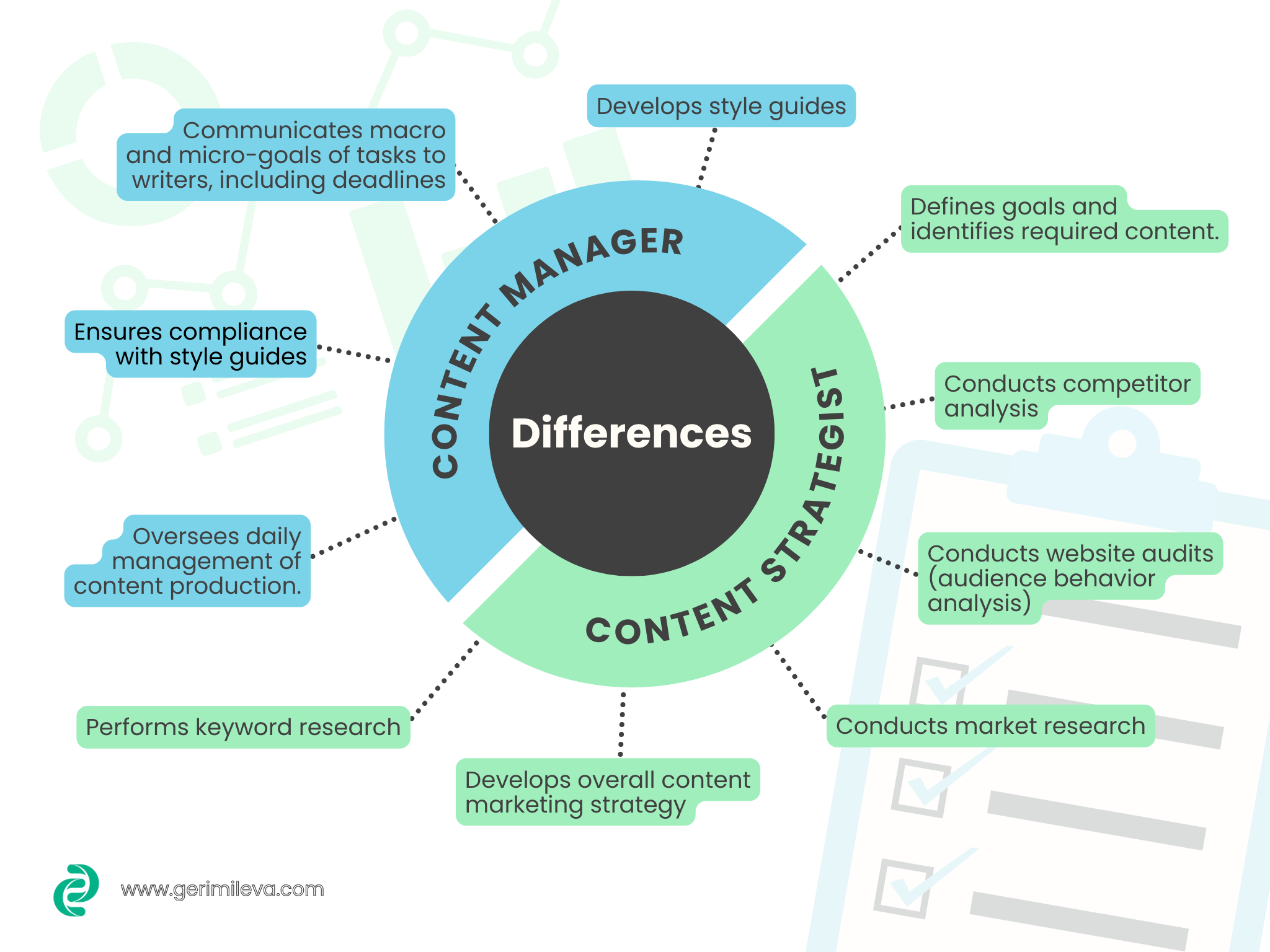
Creating your content plan
Once you have a strategy, you can make a content plan outlining how to achieve your goals. This plan covers your topics, formats, publication dates, and platforms for distribution. All these factors enable your team—including your SEO writer—to stay organized and accountable.
Content planning involves these three processes:
Keyword mapping
Keyword mapping is the process of allocating a set of related keywords to a specific page. This technique aims to populate the page with terms that are relevant to the user’s search intent.
The main keyword defines the topic of the page, while the rest are alternate versions of the main keyword with equivalent meaning and intent. Many keyword research tools offer automatic features for generating these keyword clusters or lists.
Content calendar creation
A consistent content publication schedule will capture your audience’s attention and encourage engagement. It also helps to time your content with upcoming events and industry trends.
Your editorial calendar must show:
Topic ideation
After conducting keyword research, the next step is brainstorming for innovative, entertaining, and valuable content ideas. Here are some ways on how you can generate content ideas:
SEO writers can keep your strategy fresh
SEO content writers always watch out for predictions and insights into the future to stay ahead of the curve. As a result, they can prepare for possible changes and act promptly on industry announcements to make their writing more relevant.
For instance, when Google releases new algorithm changes, writers can take measures to prevent their client’s content from being outranked by rivals.
Around a third (36.3%) of SEO professionals polled by SEJ believe that generative AI (GenAI) in search will disrupt SEO performance in the next few years. With GenAI creating summaries of information from various sources, brands may experience a decline in website traffic. Moreover, access to AI content generators is expected to fuel competition in search.
SEO content writers can help your brand stand out by not dwelling on a single question-single answer approach. Instead, they can shift to a cluster content strategy consisting of long-form pillar pages that comprehensively discuss topics where the business has authority. By developing sub-topics and follow-up questions to flesh out various aspects of a subject, SEO writers can signal greater topic authority to search engines.
In light of Google’s Search Generative Experience (SGE), SEO writers can improve the chances of your content appearing in Google’s AI summary. They achieve this by creating high-quality content that aligns with your target reader’s search intent, structuring text into sections, and ensuring each section fulfills its subheading’s promise.
Next, I’ll discuss the most pertinent Google algorithm updates and how to take advantage of them.
Staying ahead with the latest SEO and content writing trends
SEO content writers must keep tabs on new SEO and content writing techniques for the following reasons:
- Search engine algorithm changes
Google’s algorithm is its system of rules for ranking website pages on its SERP. The search engine’s ranking factors change with each algorithm update, becoming a top website traffic disruptor for the majority (40%) of SEO pros surveyed by SEJ.
However, understanding these changes enables SEO writers to continuously adjust their content components and writing process to meet Google’s most current ranking criteria.
- New technologies affecting user behavior
Technological advancements can change your target market’s search preferences and patterns. Writers must create and deliver content to match customers’ evolving demands.
Providing a seamless user experience is among the top expectations in the market. If your SEO content writer meets this need, it can result in increased engagement and conversions for your brand.
- Competition
Through research, writers can discover how other industry players invest in improving their search rankings and recommend ways you can keep up or even outdo others.
- New SEO-related tools and knowledge
Your writers must adapt to new industry software (website auditing, link-tracking, A/B testing tools) and tactics (voice search optimization, answer engine optimization, traffic source diversification).
- Penalty prevention
Knowing and complying with search engine algorithm changes or guidelines will help you avoid committing violations. This preserves your clean and positive online reputation.
Latest trends in SEO and how to ride the wave
Here are some trends shaping the SEO landscape and how to use them to your advantage:
Google AI Overviews: Optimizing content for Google’s AI-generated summaries
While we were still trying to wrap our heads around Google’s SGE, the search engine rolled out AI Overviews in May 2024, initially in the US. The tool answers a query with an AI-generated summary and links to relevant websites for users to explore. Users get the highest quality links from diverse sources because Google designed AI Overviews to show information from top web results.
Moreover, the tool can respond to complex queries through “multi-step reasoning.” Explaining the concept during the company’s 2024 I/O Conference, Head of Google Search Elizabeth Reid said:
“It (the AI) breaks down your bigger question into all its parts and figures out which problem it needs to solve and in what order.”
With AI Overviews becoming available in more locations and languages, marketing teams must learn how to refine their SEO strategy for this tool. According to the Google Search Central page discussing How do links appear in AI Overviews:
“There is nothing special for creators to do to be considered (for inclusion by Google AI Overview) other than to follow our regular guidance for appearing in search.”
Nevertheless, I recommend applying the steps in the next section to optimize your content for Google AI Overviews.
How to optimize content for Google AI Overviews
Consider adding these principles to the SEO best practices you’re already practicing to improve your visibility on Google AI Overviews:
- Provide clear, direct answers to common questions
Why it matters: Like other AI search engines, Google AI Overview is designed to provide well-synthesized and immediate responses to users’ inquiries. Thus, it prefers straightforward and concise content to often high-interest questions or frequently searched terms.
How to implement: Think of your readers’ most probable questions and answer them directly in your content. Present them in short text blocks via an FAQ section, summary, numbered list, or bullet points.
- Use a well-defined structure with headings
Why it matters: Structured formatting—with descriptive headings and subheadings—helps Google’s algorithms better understand the content and context of your pages. This makes it easier for the platform to include you in AI Overviews.
How to implement: Use a hierarchical structure (H1, H2, H3). Include terms in the subheadings directly related to the topic so Google can quickly grasp your content’s main points.
- Optimize for featured snippet formats
Why it matters: Google AI Overviews aims to provide searchers with a zero-click experience, wherein they find information directly on the search results without clicking on a website. To achieve this, your content must be comprehensive enough to land directly on the SERP.
How to implement: The tool pulls from lists, tables, and short paragraphs like Google does for Featured Snippets. These formats divide content into manageable chunks, allowing Google to summarize more effectively.
- Emphasize authority and trustworthiness
Why it matters: Google extracts information from reliable sources, gauging them by its E-E-A-T principles (which I devoted a separate section to below).
How to implement: Use credible sources for your content, ensuring the accuracy and freshness of data. Include author bios and links to original studies, expert opinions, and reputable websites.
SearchGPT: Adapting your content for AI-driven search tools
OpenAI, the creator of ChatGPT, began beta testing SearchGPT in July 2024, offering real-time, ad-free search results integrated into ChatGPT. Instead of traditional search engine links, it provides conversational summaries with source attributions, images, and multimedia, encouraging deeper exploration through follow-up prompts.
Initially available to a limited group, SearchGPT expanded access to ChatGPT Plus and Team subscribers in late October 2024, with plans for broader availability. As AI-driven search tools grow, SEO writers should adapt strategies to ensure content is optimized for platforms like SearchGPT, beyond traditional search engines.
Why SEO content writers should leverage SearchGPT in their strategy
Here are two main reasons for gearing up your SEO for SearchGPT:
- Expanding beyond traditional search engines
Search habits are shifting as people explore platforms beyond traditional search engines, such as social media and niche forums. AI tools like SearchGPT are revolutionizing searches into interactive experiences, prompting businesses to rethink their strategies to ensure content remains discoverable in this evolving landscape.
- Evolving SEO priorities for writers
SEO writers need a new set of tactics to rank high in generative AI results. The focus shifts from transactional keywords and backlinks to topics and questions their target market is exploring. Content should directly meet the readers’ needs through detailed, insightful, and up-to-date information with reliable reference sourcing.
Key techniques to optimize content for SearchGPT
The following steps can help boost your content’s chances of showing up on SearchGPT results:
- Prioritize a clear structure and logical flow
Why it matters: Well-structured information allows SearchGPT to quickly determine if your content provides an answer to a user’s inquiry.
How to implement: Create an organized and easy-to-read structure by breaking up your content into different headings (H1, H2, H3, and so on). Each section should flow logically to the next. Moreover, explain concepts in bullet points and short paragraphs to make complex information more digestible.
- Use natural language and relevant contextual keywords
Why it matters: SearchGPT can grasp the search intent (or semantic relevance) behind a query, unlike traditional search engines that rely on keyword matching and density. The AI tool is also designed to generate human-like responses.
How to implement: Anticipate readers’ questions and tailor content to mirror how people will answer them. Naturally use variations of the main keyword, long-tail keywords, and related terms throughout your body text.
- Incorporate data and credible sources
Why it matters: SearchGPT favors content linked to authoritative and contextually relevant sources, prioritizing quality over quantity. To assess credibility, the tool analyzes reviews, conversations, and consumer sentiment, including the frequency of positive and authoritative mentions across multiple platforms.
How to implement: Reference reputable sources, adding statistics and case studies where they’re relevant. Naming relevant and trusted entities (personalities, places, or things) in real-world examples also boosts credibility.
- Focus on intent-based content creation
Why it matters: SearchGPT and traditional SEO aim to suggest references closest to a user’s intent. However, SearchGPT can infer intent more accurately from natural language, resulting in more direct and personalized answers to queries—which as we discussed earlier could be informational, commercial, navigational, or transactional.
How to implement: Identify the primary intent behind a topic and develop your content to meet that need. For instance, provide detailed answers with visual support if the search goal is informational. Meanwhile, content should guide readers through the buying process when the intent is transactional.
At the same time, you can use tools to discover what users are asking about your topic, such as Answer the Public, or to stay updated on popular search queries, such as Google Trends or AlsoAsked.
- Optimize for featured-snippet style responses
Why it matters: Like Google’s featured snippets, which appear at the top of organic and sponsored results, SearchGPT’s summaries are straightforward and brief. The tool will likely favor content written in this style and length.
How to implement: Include concise summaries at the beginning and end of your content, structured data, ‘how-to’ lists, and FAQs. These sections help SearchGPT extract key information quickly without scanning the entire document.
- Emphasize quality and readability over keyword density
Why it matters: Since SearchGPT prioritizes credible sources and natural language, it will prefer content with these qualities over pieces overly optimized with keywords.
How to implement: To reinforce points 1 to 3, factors like relevance and engagement from clearly written, engaging, and organized content will take precedence over keyword density in SearchGPT’s selection.
Best practices for staying ahead with SearchGPT optimization
- Regularly review AI trends
Track AI trends and evolving SEO practices so your team can adapt to new features or ranking factors, stay informed on timely topics, and maintain its competitive edge.
- Test your content in AI summarizers
Check how SearchGPT might interpret your content using AI summarization tools like QuillBot, Jasper, or SummarizeBot. AI uses large language models to understand the meanings and sentiments within the text, paraphrasing its essence. You’ll know your content is clear and logically structured when the summarizer’s output shares the key points you wish to highlight.
- Blend traditional SEO with AI-specific techniques
You don’t need to abandon best practices for traditional SEO when optimizing for SearchGPT. However, you should adjust content for new ranking factors in AI search, particularly natural language and user intent.
Voice search
The use of voice-assisted devices has become popular due to their convenience and speed, according to a 2023 PYMNTS report titled “How Consumers Want to Live in the Voice Economy.” Data compiled by Market.us in 2023 showed that over 1 billion voice searches happen monthly worldwide.
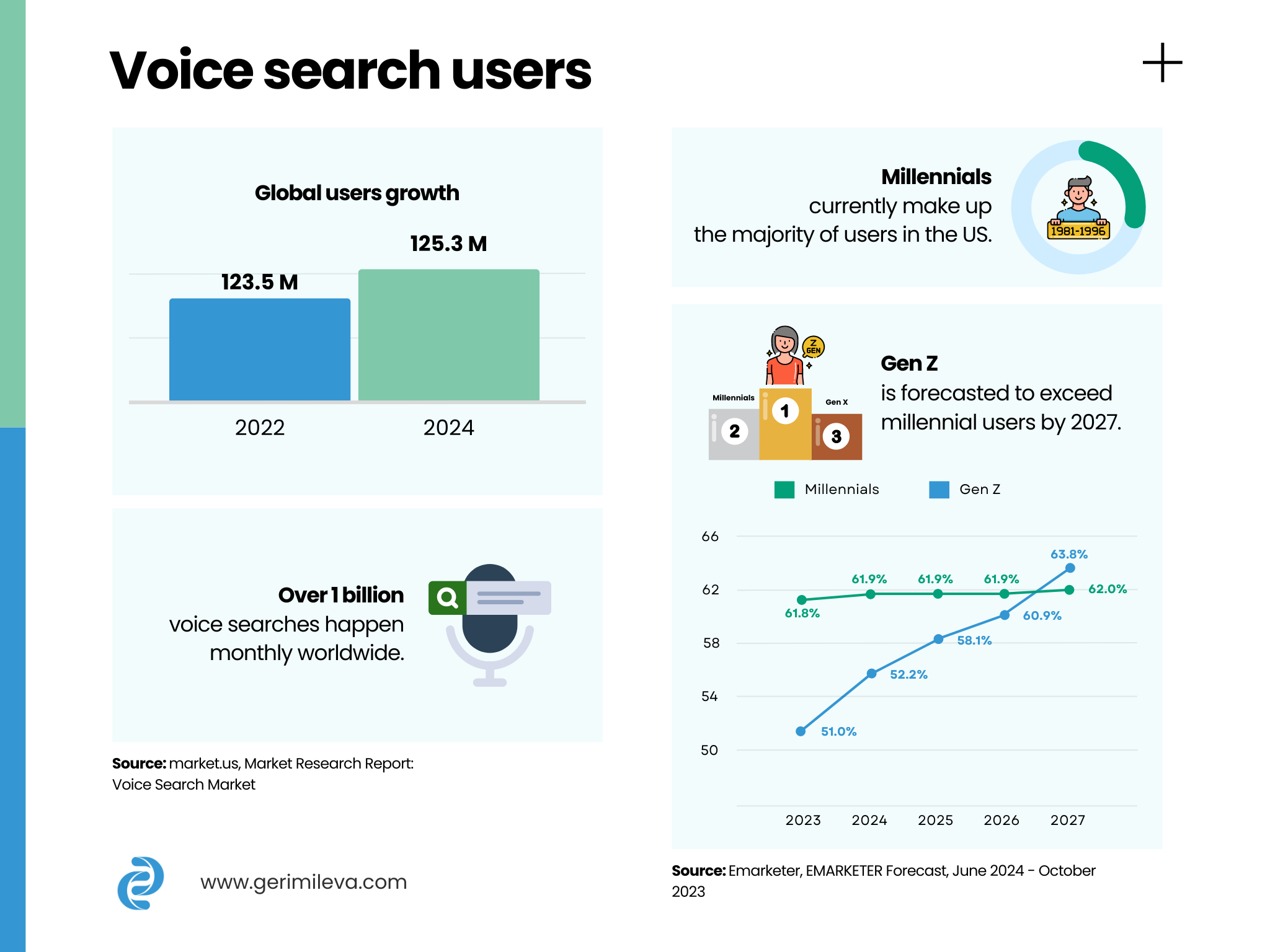
Global users number 4.2 billion and may hit 8.4 billion by the end of 2024. In the US, millennials make up the majority of voice assistant users, according to 2023 eMarketer data. However, Gen Z is forecast to exceed millennial users by 2027.
SEO tips: To rank for voice search, use long-tail keywords. Remember, voice queries are longer and more conversational than text-based searches. Include words closely related to your main topic through keyword mapping. Also, integrate place names specific to your target audience.
Integration of Google Lens in search
Google first announced that Google Lens was “coming to Chrome desktop” in 2021, four years after its launch on Pixel phones. However, the feature only became available on the desktop browser in 2024, a year after becoming accessible for Android and iOS phones. With this AI tool, users can utilize images to help them learn more about a topic or product, improving the search experience.
Google’s expanded search capabilities should prompt SEO writers and content creators to optimize beyond text. Doing so will allow images, videos, and metadata to capture traffic during image-based searches.
Key techniques to optimize content for Google Lens searches
The following steps will help optimize your visuals for Google Lens searches:
- Use high-quality, relevant images
Why it matters: Clear and sharp visuals on your web pages will result in equally appealing thumbnails on Google’s SERP. The results can entice internet users to visit your website. At the same time, optimizing photos by choosing the dimensions, file size, and format suitable for online viewing improves page loading speed. Fast loading times improve user experience and keep bounce rates low.
How to implement: Use original images with a resolution appropriate for the web. Also, select photos that will substantiate your written content to meet your users’ search intent.
- Add descriptive alt text and captions
Why it matters: Including alt text or a brief text description of your image makes it easier for Google to determine whether it matches a user’s search query. Alt text is also necessary to comply with web content accessibility standards. Screen readers or other assistive tech solutions read the alt text aloud, allowing visually impaired individuals, including those who are blind or have low vision, to understand an image’s purpose on a web page.
How to implement: Keep the length to 1-2 sentences. Instead of saying “picture of” or “image of,” specify if the image is a painting, illustration, logo, or diagram. Ensure that you include relevant keywords that accurately describe the photo or video. However, avoid using words identical to the text near the image, particularly the article body. End alt text sentences with a period.
- Optimize file names and image metadata
Why it matters: In addition to descriptive alt text, concise and descriptive file names help Google better understand the content of an image. Meanwhile, metadata is data embedded within the image, including details about itself and the conditions surrounding its creation. This metadata can include file size, dimensions, date, time, and the location of the shot. These pieces of information make it easier for you to categorize and search images. Additionally, storing ownership details helps protect your copyright of these digital assets.
How to implement: Ensure that file names are concise, consisting of five words or fewer. They should clearly and accurately describe the image using straightforward language. Use hyphens instead of underscores, as Google doesn’t recognize underscores. Google treats hyphens as spaces. For example, revise a default file name “IMG_348592.jpg” to “elderly-couple-walking-with-dog.jpg.”
For metadata, edit or update metadata fields using photo editors or file explorers. For the IPTC (International Press Telecommunications Council) image format, fields include keywords, captions, location, creator, and title. Meanwhile, the EXIF (Exchangeable Image File Format) contains information about camera settings.
- Enhance visual content with structured data markup
Why it matters: Adding structured data or schema markup to your images increases the chances of them appearing on Google’s rich results, formerly rich snippets. These search results display your content with more details, such as ratings, reviews, and pricing. This additional information makes results more eye-catching than typical results. Although structured data isn’t a ranking factor, it provides better context to search engines and the potential to boost click-through rates.
How to implement: Google’s Structured Data General Guidelines provide tips to make your images appear in their Rich Results. Moreover, the Google Structured Data Markup Helper is available to help you mark up elements on HTML web pages or HTML emails.
- Optimize video content with transcripts and captions
Why it matters: Video made up 65% of all internet traffic in 2023, according to Sandvine’s Global Internet Phenomena Report. When preparing videos for online viewing, polished production isn’t enough. You must apply techniques to allow search engines to index them. During indexing, search engines analyze text-based elements associated with your video—such as transcripts and captions. This way, Google, Bing, and others quickly understand the topic and assess whether it matches a search query. Moreover, transcription and closed captioning enhance the accessibility of videos for internet users who are deaf or hard of hearing.
How to implement: Consider audio quality from the beginning by ensuring you record in an environment with minimal background noise and other ambient sounds. Invest in a high-quality microphone, appropriate setup, and editing/mixing software.
Use transcription software but proofread manually. Some popular choices include Rev, Otter.ai, Trint, and Happy Scribe, though these AI-powered tools may not always be 100% accurate. When using software to translate your transcript into another language, hire a native speaker or professional translator to ensure accuracy in AI-generated transcripts.
Additionally, you can take advantage of the built-in features of your social media platform to automatically show closed captions for your uploaded videos. To make captions more appealing, you can set a style guide for your brand regarding caption placement (bottom-center or speaker-oriented), font, color, and character limits.
- Enhance visual content with structured data markup
Why it matters: Your visual content can generate backlinks just like text content does. Users and Google will consider your images credible when other websites link back to your images, resulting in more clicks and improved website authority. These links also add variety to your backlink profile, sending a positive signal to Google of your balanced link-building strategy.
How to implement: Choose images that attract backlinks, such as infographics, graphs, high-quality and original photos (especially for product photos), maps, and videos. Design visuals that explain something or solve a problem, such as an infographic showing a step-by-step procedure. Keep the design simple and clear, with eye-catching fonts and colors. Use tools to analyze your competitors and identify which images are acquiring backlinks.
Then, place your images within blog posts and guides or promote them via social media and image-sharing platforms (Flickr, Pinterest, Imgur). Use an embed code generator that will make it easy for others to share your images. This code automatically links back to your site.
You can also use tools such as Image Raider to track your images across the web. These solutions notify you once your image appears on other websites. When that happens, connect with the website owner to see if they could add a picture link to your site as the source.
The TRUST formula by Ahrefs’ David McSweeney is a popular guide for creating quality backlinks. Published in 2020, SEO specialists continue to promote its principles today. TRUST stands for trending topic, research plus analysis, unique (unexpected or unusual) takeaway, simple visual, and tactical promotion.
E-E-A-T
E-E-A-T is the acronym for Google’s search quality rater guidelines. It only used to be E-A-T or expertise, authoritativeness, and trustworthiness until the addition of “experience” in 2022. This new quality refers to a writer’s first-hand experience with the topic.
It is essential to what Google calls “Your Money or Your Life” (YMYL) topics affecting the finances, health, safety, and happiness of users. A content piece comes off as more authentic, tried, and tested when it’s based on the author’s experience or expert opinion.
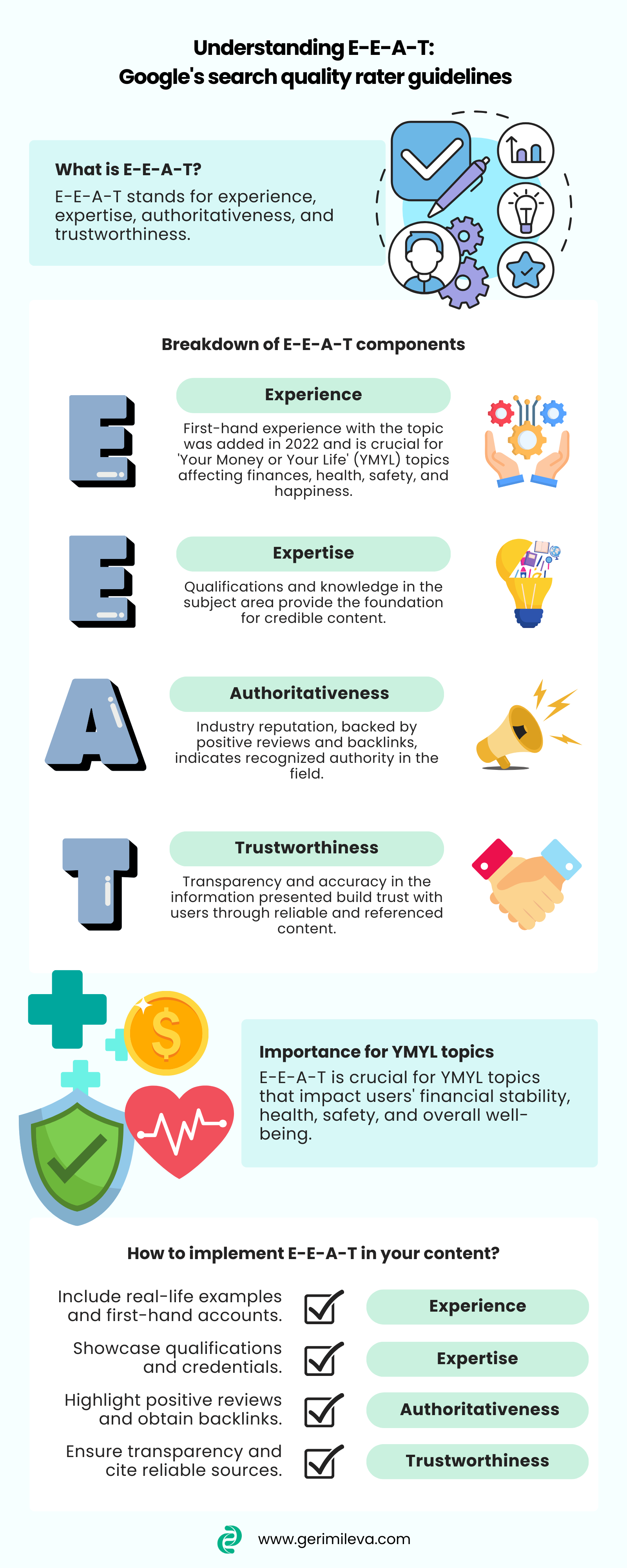
If giving real-life examples proves experience, providing qualifications establishes expertise. Meanwhile, authoritativeness through positive reviews and backlinks to your site indicates your industry reputation. Finally, trustworthiness refers to transparency and accuracy for featured information and references.
The majority (21.6%) of SEO practitioners aim to improve content alignment with E-E-A-T and user intent in 2024, according to SEJ’s report. Instead of targeting wide audiences, SEO professionals will focus on engaging high-value customers who take action on the brand’s website.
SEO tips:
For experience, your SEO writers can interview industry leaders so you can feature their quotes and insights in your posts. They may also invite subject matter experts to co-author articles or review your content for accuracy.
Meanwhile, highlighting credentials, citing reputable sources, and giving in-depth analysis display topical expertise. You can also feature user-generated content from credible sources.
To ensure authoritativeness, use tools like SEMrush to check on your backlinks. Then, check the referring domains, which link to your competitor’s pages. Identify gaps in your content to determine ways of enhancing it.
To build trust, provide accurate facts from trustworthy sources, precise contact details, and a transparent policy on data security to prevent harm and misinformation.
The SEO 2024 report by SEJ says that offering content that’s superior in comparison to your competitors (18.1%) is a top link-building strategy among SEO experts. Other top methods include alternative media strategies—such as infographics, video, and other tools—(13.7%), PR/journalism (13.7%), and guest posting (12.9%).
Long-form content
Long-form content, while not a new concept, has recently gained significant recognition for its value in improving search engine rankings, especially when it is high-quality and informative. This content type can range from 1,500 to 20,000 words, allowing you to discuss topics extensively. White papers, case studies, eBooks, and “ultimate” guides commonly use this format.
SEO tips:
Use long-form content to build brand authority. Your SEO content writer can include more internal and external links in this format than in short-form pieces. Moreover, your content can benefit from longer dwell times and social media shares.
Orbit Media’s 2023 Annual Blogger Survey—which polled at least 1,000 bloggers—showed that longer blog posts tended to produce better results. Participants identified certain “results” as success indicators, such as website traffic, lead generation, brand awareness, and email list growth.
Other changes in search engine algorithms
Other than E-E-A-T, here are other top Google updates between 2023 and 2024:
- Writing reviews
Reviews have been expanded beyond products to cover services, destinations, and media (movies and games). You’ll find 14 best practices for creating “high-quality reviews” on Google Search Central.
- Automation-generated content
Google’s definition of spam covers low-value content produced for manipulating ranking or linking signals directing users to one’s site. While Google allows responsible automation or AI usage for content production, it prohibits scaled content abuse. This refers to generating unoriginal, low-quality content—whether via automation, humans, or both—to rank high on search.
- Assessing content for a “people-first” focus
Although Google first made this call in 2022, it reminded content creators not to write for search engines but for people in its 2023 update about using AI-generated content.
Its guide on “helpful, reliable, people-first content” features sets of content assessment questions. Google updated the guide’s “Ask ‘Who, How, and Why’ about your content” section in 2023.
Make your content stand out and convert with professional SEO writers
With a better understanding of SEO writing and the writer’s role, you can start searching for one more confidently. Or you can at least present the idea of acquiring or outsourcing such a writer with your business partners or colleagues. Then, you can nurture your relationship with your chosen writer by using effective software, clarifying the content’s goals, and establishing success targets.
Based on a 2023 Ahrefs survey conducted on LinkedIn and X, it can take up to six months to see the results of SEO content writing. However, actively optimized content will increase CTR and page views over time, making SEO a worthy long-term investment.
If you’re exploring options for SEO content, I’d be glad to help tailor solutions to your needs. Feel free to get in touch through my Contact Page.

